Text
Cold War Killer Blow Back
A new study by University of Arizona economist Keith Meyers reports that above-ground bomb tests caused between 340,000 and 690,000 deaths in the United States between 1951 and 1973.
The "Ghost Disease" Haunting DPRK's Nuclear Test Site Is an NBC News Fabrication
In December 2017, NBC News published a story titled “North Korean defectors say nuclear tests have ravaged their health.” The article begins with a sensational headline and ominous descriptions of a “ghost disease” haunting residents of DPRK’s former nuclear test site at Punggye-ri. However, near the end of the article, NBC News buries scientists’ caveats: there is a “total lack of data” supporting the allegations about the ghost disease. In addition, NBC’s defectors’ radiation tests are completely clean, and no radiation leaks have been detected near Punggye-ri.
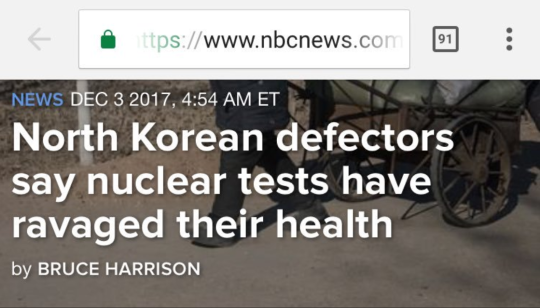

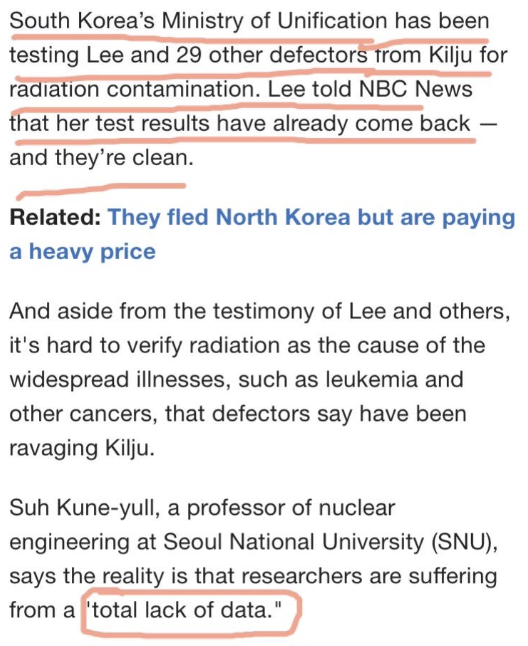
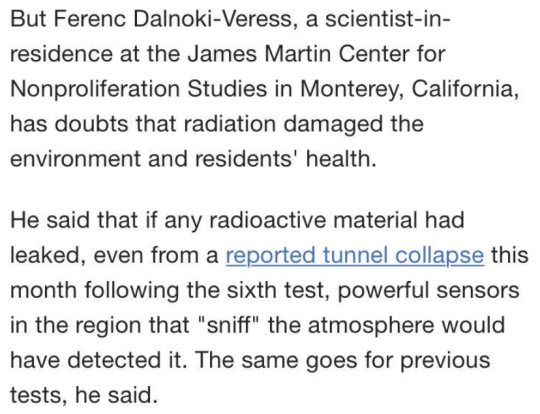
In addition to the lack of scientific data to support the defectors’ claims about radiation sickness, the defectors’ descriptions of life in DPRK are patently absurd.
The two defectors quoted in the piece — Lee Jeong Hwa and Rhee Yeong Sil — claim they were unaware of the nuclear tests that occurred while they still lived in DPRK. However, DPRK state media reported the tests as soon as they happened, as proven by the following screencaps from DPRK’s own 2006 & 2009 news reports, which correspond to the time the defectors lived in DPRK. As well, it’s completely implausible that the defectors would have been able to ignore seismic activity that occurred due to the tests.
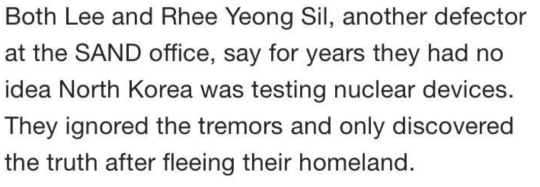
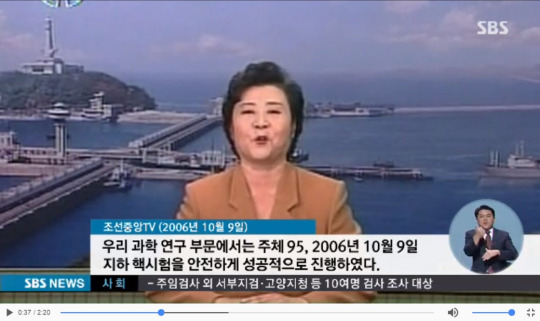
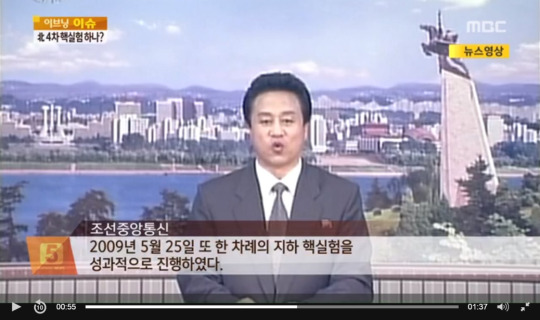
The defector Rhee tells a bizarre story of her involvement in trying to determine the gender of her supposed neighbors’ supposedly “deformed” child. It’s ridiculous to think that DPRK citizens would invite neighbors, rather than trained medical professionals, to participate in deliberations regarding a child’s gender in any case. This description of DPRK life is a projection of Western beliefs that DPRK citizens resemble tribal, cave-dwelling people rather than modern socialists.


Lee and Rhee, speaking under their own names, claim that their family members in DPRK talk to them via smuggled Chinese cell phones. This contradicts other sensational defector tales that depict the use of Chinese cell phones as a crime worthy of death in DPRK. Although I highly doubt that any DPRK citizen has ever received a death penalty for using a Chinese cell phone, it’s worth noting the shoddiness of NBC News’s anti-DPRK propaganda, which blatantly contradicts other outlets’ anti-DPRK propaganda.

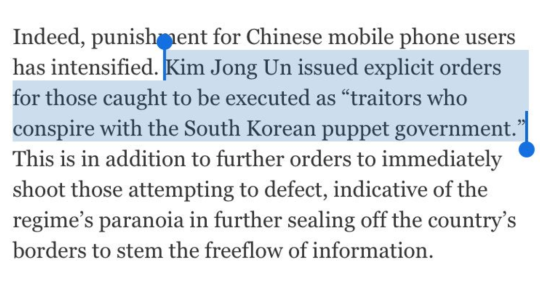
The head of SAND (South and North Development), Choi Kyung-hee, provided the defectors Lee and Rhee to NBC News. Choi has a record of boosting fabricated propaganda related to DPRK’s nuclear test site, including the baseless DPRK “tunnel collapse” story from a US puppet publication in Japan.

The author of the NBC News “ghost disease” piece, Bruce Harrison, refused to answer questions about whether he, NBC News or SAND provided compensation to defectors Lee and Rhee for their sensational testimony.
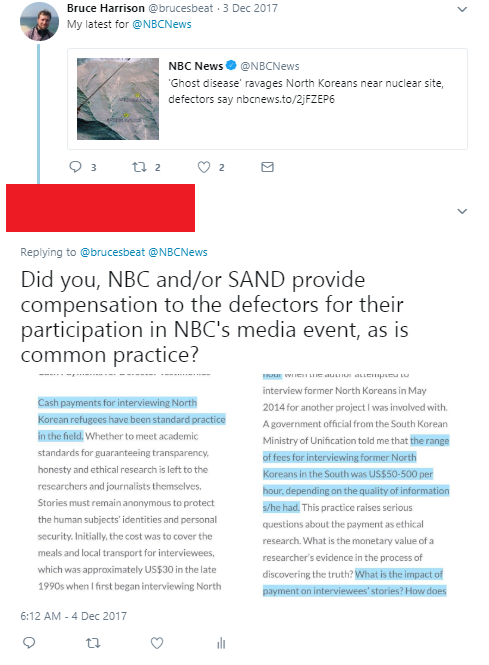
Meanwhile, the “ghost disease” myth has spread throughout imperial media, based on nothing but the easily disproved lies of two likely paid actors. Notably, most of the subsequent stories removed scientists’ caveats about the lack of data supporting the defectors’ allegations.

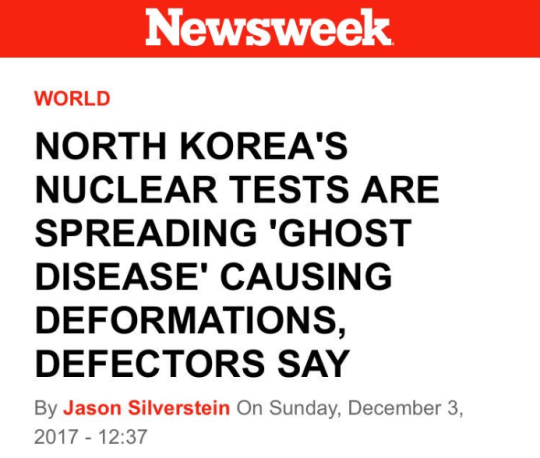
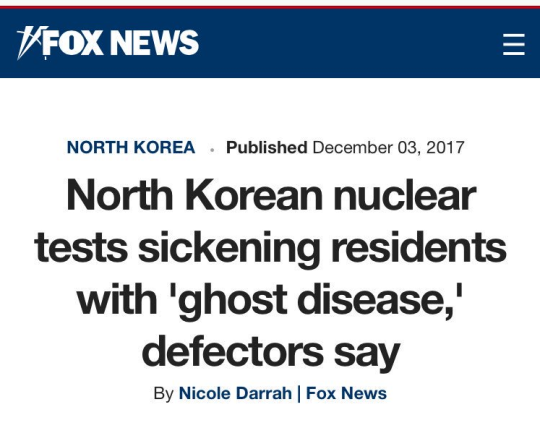
223 notes
·
View notes
Text
DPRK’s Coal-Gasification Program Isn’t “Little Known”
On Dec. 17, 2019, the Wall Street Journal published an article called “North Korea Turns Coal Into Gas to Weather Sanctions.” The article’s introduction says:
North Korea has accelerated a little-known program to use its abundant coal supply to produce synthetic gas, helping the isolated nation reduce its dependence on foreign oil and withstand sanctions aimed at curbing its nuclear program.Pyongyang is relying on coal gasification to buttress its economy against United Nations curbs on its petroleum imports, according to foreign officials and experts.
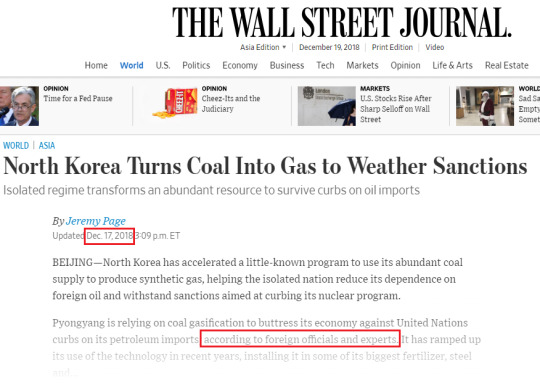
Contrary to the WSJ’s reporting, DPRK’s coal-gasification isn’t “little known.” DPRK citizens have been talking about their country’s goal-gasification efforts for years.
In his 2012 publication Korea in the 21st Century, DPRK writer Ri Song Hwan states, “Following the perfection of the system of producing Juche iron at the Songjin Steel Complex, the Ragwon Machine Complex manufactured a 15,000 ㎥-capacity oxygen plant by its own efforts for the process of coal gasification.”
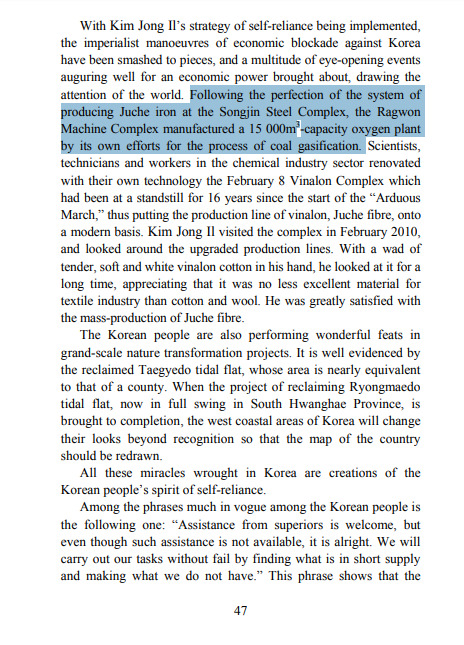
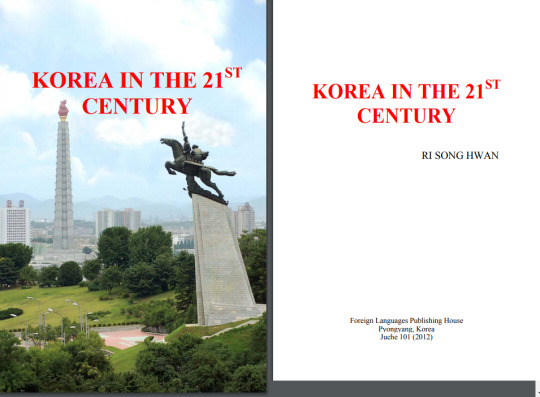
According to a December 2016 article from DPRK’s KCNA news service, “The DPRK has concentrated its efforts on establishing the C1 chemical industry based on coal gasification, one of the goals of the five-year strategy for national economic development.”

DPRK economist Kim Chol stated that DPRK has been using C1 chemistry to convert gasified coal into refined fuel, according to an interview that was published in January 2018.
Additionally, DPRK’s Rodong Sinmun newspaper has published many articles referring to coal-gasification throughout 2018.
Despite all this evidence from the DPRK itself, WSJ falsely portrays DPRK’s coal-gasification efforts as a “little-known program,” the existence of which only “foreign officials and experts” can verify.
As one Twitter commenter noted, “MSMs regularly dismiss the firsthand information from DPRK as propaganda and then they happily subscribe to the disinfo outlets and quack experts.”
29 notes
·
View notes
Text
The US military’s 18-hole golf course at its Camp Humphreys base in Pyeongtaek, RoK, takes up approximately 93 hectares. Ninety-two percent of the cost of the expanding the base was borne by RoK Koreans, so that means that RoK Koreans paid nearly all of the cost of a golf course that they are forbidden to use.
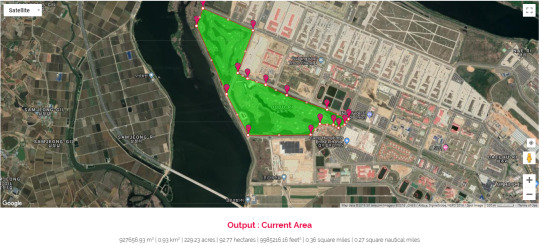

Excluding the golf course at the THAAD base in Seongju, the total area allotted to the US military’s golf courses in Korea is now 300 hectares, or 3 square kilometers.
(Also: I mistakenly used tons instead of tonnes to calculate the rice yields above. If 1 hectare of land in RoK produces 5.6 tonnes of rice per year, that’s 5,600 kilograms per hectare. If the 300 hectares of US military golf courses were converted to rice paddies, the annual yield would be 1,680,000 kilograms of rice. Based on RoK’s 2017 per capita rice consumption of 61.8 kg, 300 hectares would yield enough rice for 27,184 people’s yearly consumption.)
Kim Jong Un’s Supposed “Yachts” versus US Military’s Golf Courses in RoK
Kim Jong-un’s alleged “yachts” have proven to be a reliable cliche for war profiteering anti-DPRK scribes.

These so-called “yachts” are boats used by high-ranking members of government to travel to coastal areas of DPRK. Should Kim Jong Un row himself around in a dinghy? Furthermore, portraying these boats as luxury items that are one man’s property — instead of a socialist state’s property — reduces the whole state to one man. It also serves the purpose of “diverting attention from the mind-boggling wealth of the true global ruling class.”
Of course, “analysts” who protest the alleged profligate luxury in DPRK are silent about the luxuries enjoyed by occupying US troops in RoK. Kim Jong-un’s supposed “yachts” are nothing compared to the US military’s private golf courses in RoK, of which there are seven, with one more coming.
1. Camp Casey in Dongducheon, 9 holes, approximately 16.8 hectares.
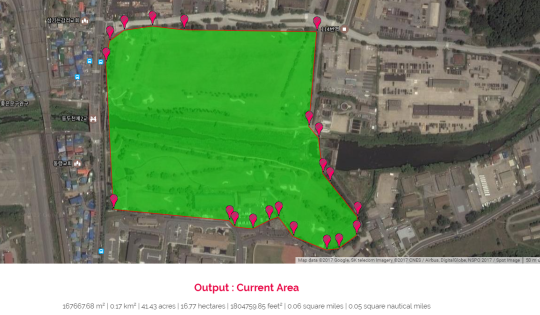
2. Camp Red Cloud in Uijeongbu, 9 holes, approximately 8.4 hectares.
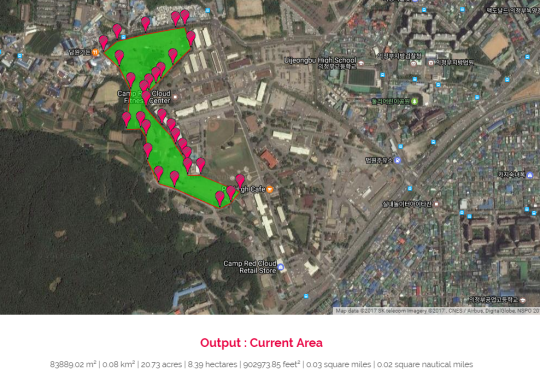
3. "Evergreen” at Camp Walker in Daegu, 9 holes, approximately 15 hectares.
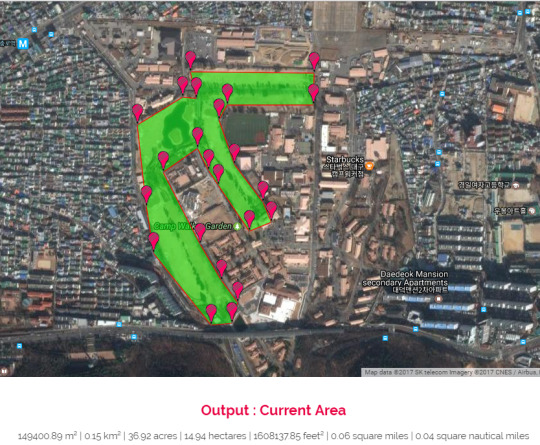
4. “West Winds” at Kunsan Air Base, 9 holes, approximately 16.8 hectares.
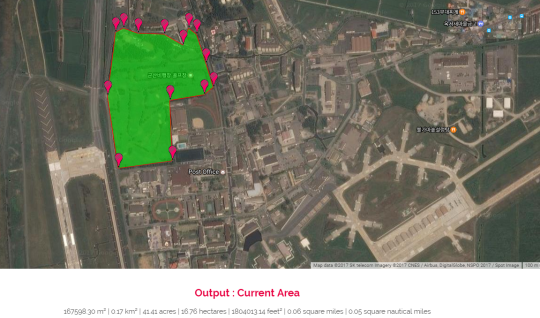
5. “The Lakes” at Osan Air Base, 18 holes, approximately 54.9 hectares.
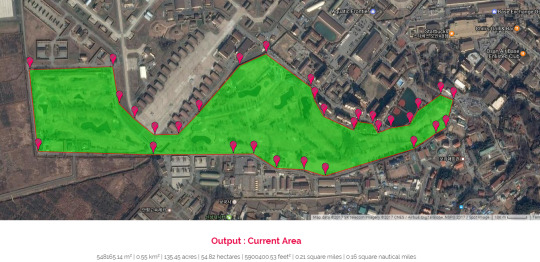
6. Sung Nam Golf Club southeast of Seoul, 18 holes, approximately 95.3 hectares.
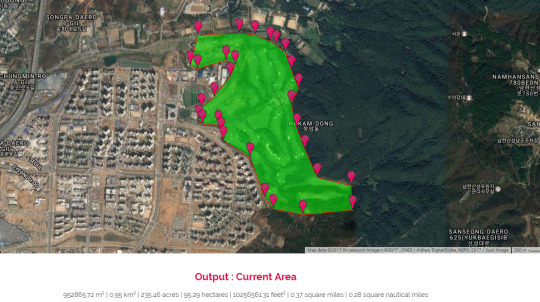

7. The THAAD site at Lotte Seongju Golf Course. According to RoK Justice Party Rep Kim Jong-dae, “US soldiers set up THAAD on one side & play golf on the other side.”
8. Forthcoming golf course at Camp Humphreys in Pyeongtaek.
Including only the first 6 courses, the land area totals approx 207 hectares, or 2 square kilometers. To put that into perspective, look at statistics for RoK’s average grain and soybean yields per hectare:
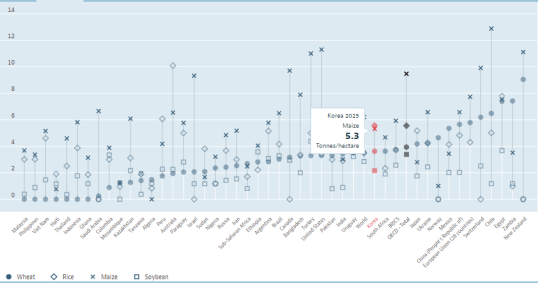
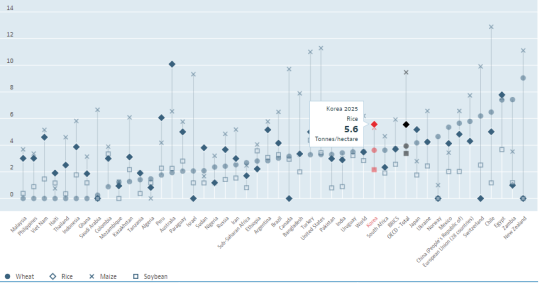
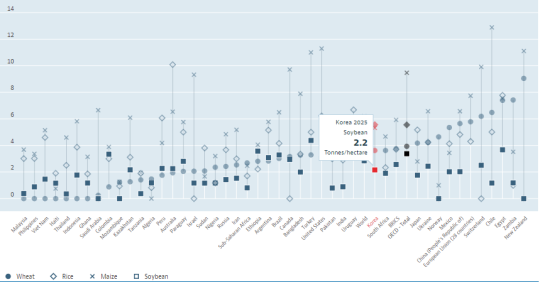

207 hectares of land could yield annually 1159 tons of rice, or 1,051,427 kilograms. That’s enough to meet average annual consumption of approx 17,000 RoK citizens. However, for the occupying and colonizing US troops, their golf is more important than Koreans’ caloric intake.
So when imperial clerks try to damn the DPRK on the basis of its own state property …

… they need to be reminded that the US has at gunpoint stolen Korean property for the purpose of golf games that are completely off-limits to nearly all Koreans. Even RoK workers who want to play at the courses are treated like 4th-class citizens.

404 notes
·
View notes
Text
Western Academia’s War Against Korea, Part 4: DePauw University’s Derek R. Ford
Introduction
“The day after Tillerson announced the #NorthKorea travel ban, I travelled to the country on a fact-finding delegation. I just got back. As soon as I arrived, the US govnt/media narrative about the [DPRK] began crumbling. I felt safe and welcomed the entire time.” - DePauw University Professor Derek R. Ford
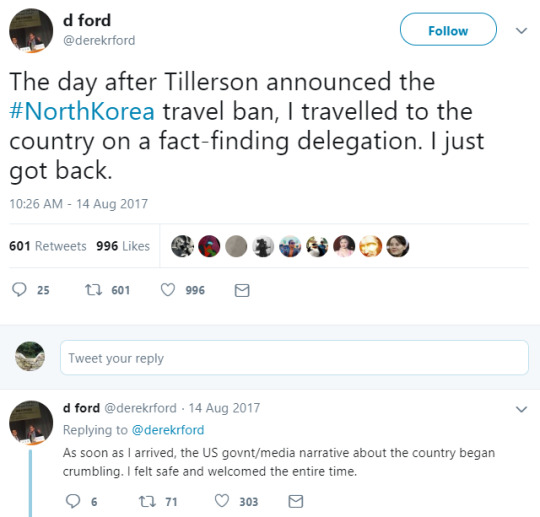
Upon reading the above tweets, one might be tempted to see Derek R. Ford as an ally of the DPRK. However, Ford is, at best, a poser who is using his feigned interest in Korean anti-imperialist struggles in order to promote himself outside the academic circles that professors usually run in. Considering the extent of Ford’s inaccurate portrayals of Korea in general, which will be documented in this article, it may be more likely that Ford is using his trip to DPRK as a shield of authenticity from behind which he can issue Korea-focused disinformation.
Contradicting Kim Il Sung: Ford’s Plagiarized Account of the Minsaengdan Incident
The most egregious example of disinformation from Derek R. Ford is his retelling of the Minsaengdan incident, which is also recounted by Kim Il Sung in volume 4 of With the Century. Kim says the incident can give "a lesson about the establishment of Juche of the Korean revolution and about the national spirit of independence." However, Ford’s account of the incident is a plagiarized apologia for the Japanese Empire in Korea, in which Ford directly contradicts Kim Il Sung.
Ford issued his account of the Misaengdan incident via a podcast called “Groundings.” The description for the episode featuring Ford promises the following content:
Organizer and educator Derek Ford gives a historical context for the current imperialist aggression surrounding the DPRK, explains the 'Juche' ideology, and recounts some firsthand propaganda-shattering experiences from his travels inside the country.
In the first place, it’s inexplicable why anyone would invite Ford — who speaks no Korean and has no specific training or education related to Korea — to give a history of Juche, when DPRK’s own English-language texts chronicle the history of Juche in great detail. Furthermore, although Kim Il Sung himself presents a highly detailed account of the Minsaengdan incident in With the Century, Ford ignores Kim's account and relies solely on a revisionist text: Han Hongkoo's chapter from Suh Jae-jung's Origins of North Korea’s Juche. Proof of Ford's reliance on Han becomes evident when one examines five specific examples from Ford’s presentation in the podcast, in which Ford's retelling of the Minsaengdan incident diverges from Kim Il Sung's account and Ford's word choices are too similar to Han's to be coincidental.
Example 1: Kim Il Sung blames Japan for creating the Minsaengdan, while Derek Ford blames Koreans for creating the Minsaengdan.
Kim Il Sung squarely blames Japan for creating the Minsaengdan, which he calls "a spy organization ... manufactured by the Japanese imperialists to paralyse the anti-Japanese spirit of the Korean people." Kim cites US-trained Governor-General Saito Makoto as personally responsible.
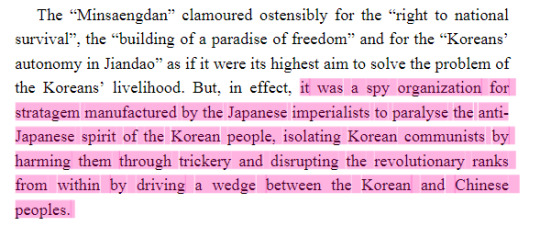
However, Ford contradicts Kim Il Sung, using Han's account to blame only Koreans.
Ford: "In Feb of 1932 ... there were these pro-Japanese Koreans which organized a group called the Minsaengdan" (at 16:30 in the podcast)
Han: "Minsaengdan was formed by pro-Japanese Korean migrants to Manchuria in Feb 1932"

Example 2: Kim Il Sung’s indictment of Japan versus Derek Ford’s acquittal of Japan
Kim Il Sung writes that Japan intended the Minsaengdan to "isolat[e] Korean communists by harming them through trickery and disrupting the revolutionary ranks from within by driving a wedge between the Korean and Chinese peoples."
In Kim Il Sung's "On Eliminating Dogmatism and Formalism and Establishing Juche in Ideological Work" speech from 1955, he says the Minsaengdan was Japan's "vile trick of alienating the Koreans from the Chinese and inciting strife among the Koreans."

Ford mentions Kim Il Sung's 1955 speech in the podcast, but he ignores Kim's assertion that Japan intended to divide Koreans from Chinese. Instead, he chooses Han's benign view of the Japanese empire. Channeling Han, Ford absolves Japan of any intent to exploit racial divisions between Koreans and Chinese.
Ford: "Japan didn't endorse [Minsaengdan and] didn't want ethnic strife or national divisions."
Han: "Japanese authorities ... hoped to lessen inter-ethnic hostilities."

(The Han/Ford portrayal of Japan as an honest broker between races not only contradicts Kim Il Sung, but it also makes the absurd assumption that the Japanese empire would reject the material gains it could accrue from exploiting the racialization of its subjects.)
Example 3: Kim Il Sung and Derek Ford’s differing assessments of the Minsaengdan’s effectiveness
Kim Il Sung writes: "The Japanese imperialists had hardly managed to implant anything [from the Minsaengdan] into our ranks. ... There is a record in an enemy document stating there were only seven or eight 'Minsaengdan' members."
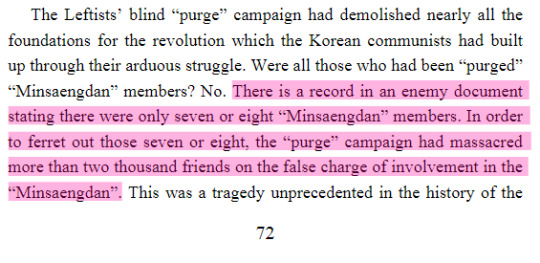
Again, Ford contradicts Kim: "It's generally agreed that there were sort of infiltrators [from Minsaengdan into the CCP]." In this regard, Ford actually goes farther than Han, who doesn't seem to say that there is a general consensus that the Minsaengdan successfully infiltrated the CCP.
Example 4: Derek Ford blames Koreans for initiating the Minsaengdan purges
Although Kim Il Sung unwaveringly blames Japan as the creator of the Minsaengdan, he doesn't actually single out any entity for initiating the violence of the anti-Minsaengdan purges. However, Ford blames Koreans for this.
Ford: "The Korean communists were enthusiastic initiators" of the Minsaengdan-related purges.
This contradicts Kim Il Sung and goes even farther than Han's assertion, "At first ... Koreans ... welcomed the Minsaengdan purge and actively participated."
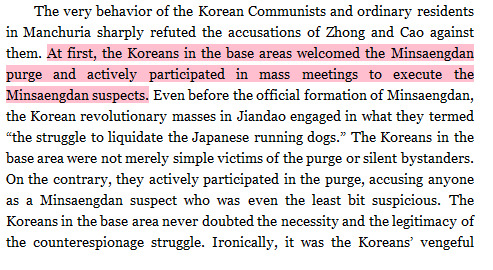
Example 5: Other similarities between Ford’s and Han’s language
Ford: The Minsaengdan purge "quickly degenerated into an anti-Korean purge."
Han: "the Minsaengdan purge, which started out as a counterespionage struggle, degenerated into an anti-Korean persecution."
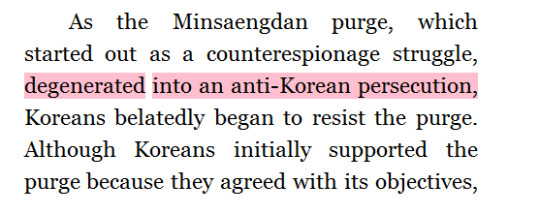
Ford’s inability to speak extemporaneously on DPRK
In addition to the similarities between Ford’s and Han’s accounts of the Minsaengdan incident and the similarities between Ford’s and Han's language, another factor makes it seem likely that Ford’s podcast presentation is based on plagiarized notes: When Ford is asked to speak extemporaneously about DPRK, he just can't do it.
In response to a question about the experiential learning he might have undergone from visiting DPRK and "seeing the Juche ideology firsthand," Ford seems completely maladroit at discussing DPRK without a prepared script. This is Ford’s answer to the question:
It's almost like a, this might seem strange, you know when you have an experience with a really, you know, unique experience with someone that you can't quite, like, articulate 100%, but you'll, like, look at each other and you know exactly what you're thinking? Okay, um, well, it's kind of like that, like, you'll ask a question, in the DPRK, and then you'll just be like, 'Oh, Juche.' Right? And it's like, that kind of, like, explains it all.
Ford’s False Claims about Koreans in the Chinese Communist Party
In case one needed more evidence that Derek R. Ford is a totally unreliable source on Korea (and other topics): He has falsely claimed, multiple times, that Koreans at one point composed the majority of the Chinese Communist Party, and he refuses to retract that claim.
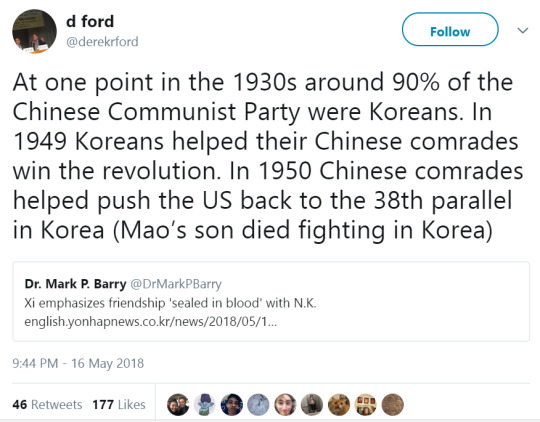
At no point in history did Koreans compose 90% of the entire CCP. That statistic is laughable on its face, but it can also be disproven with evidence.
Koreans did compose 90% or more of the CCP in some parts of Manchuria in the early 1930s. "Between spring 1932 and spring 1934 ... in E. Manchuria, S. Manchuria, N. Manchuria, and Jidong ... Koreans constituted the majority, both in the Party and in the CCP armed forces."
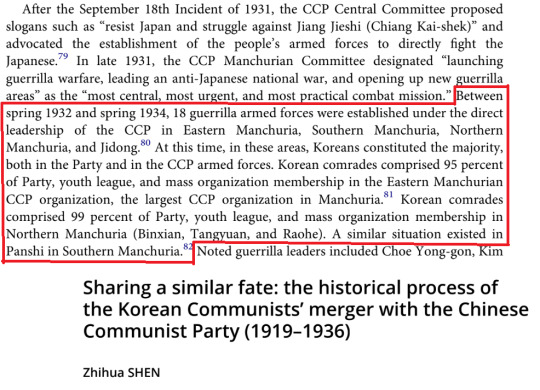
However, considering that CCP membership was 40,000+ in 1928, and Koreans didn't join the CCP en masse until 1930, if 90% of the CCP were Korean, that would mean that there were at least 360,000 Koreans versus 40,000 Chinese in the CCP.
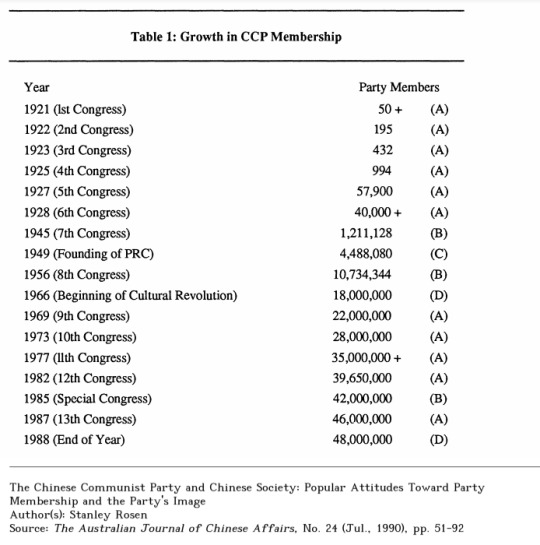
Presumably, the number of Koreans in the CCP would peak before the Minsaengdan purges of the mid-1930s. Given that most Koreans in China lived in Manchuria, Ford's statistic would mean that approximately 50% of Koreans in China were CCP members. Demographically, that's highly unlikely.
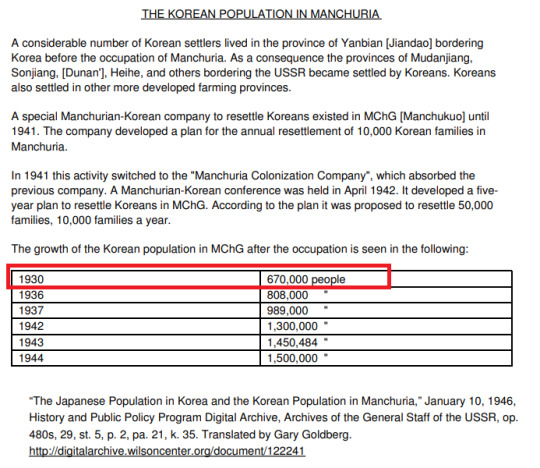
This error has been pointed out to Ford, but he refuses to acknowledge it. That's probably because he put the error in one of his books (which costs $141.98), and he wants to save face for his editor/publisher/etc.
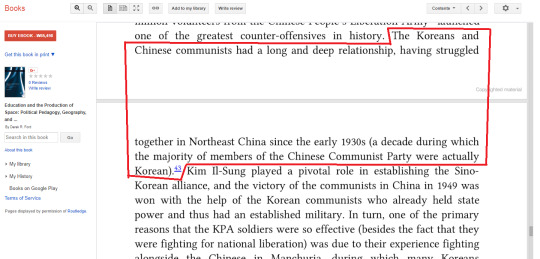
Using Koreans as Props
Ford has a tendency to use Korean people and Korean aesthetics as brand-building accessories. For example, the below-pictured tweet contains no information about Ford’s "comrade" or her situation — not even her name!

Because Ford can’t read the below-pictured publication, he can only post a picture of its graphic for his followers to admire.
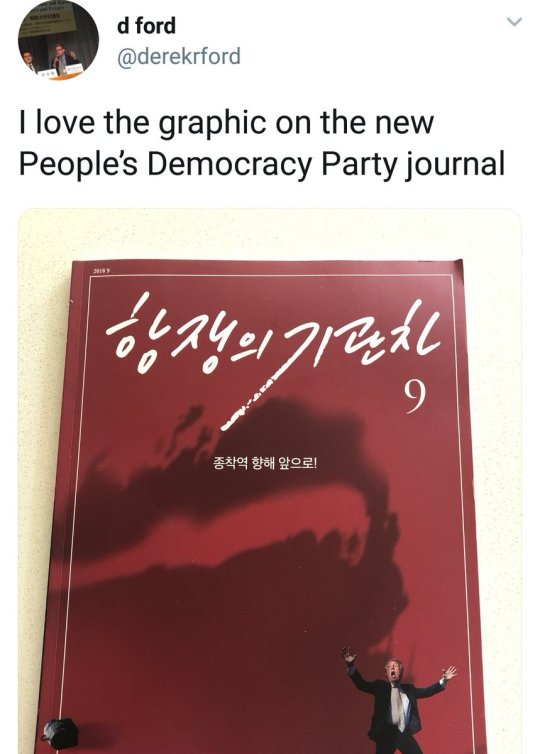
The tweets pictured below are really something. Ford claims that he has gone to the airport with RoK organizers who try to check in to their flights and discover that they can’t leave the country. Certainly, RoK does prohibit some of its citizens from leaving the country; for example, the kidnapped restaurant workers from DPRK have been unable to obtain passports. However, it’s completely implausible that US citizen Derek Ford would be in RoK, leaving that country while accompanied by RoK organizers who are left behind as Ford departs. The implausibility of this scenario is exemplified by Ford’s inability to share any details of the situation at all, other than, “I was there.”
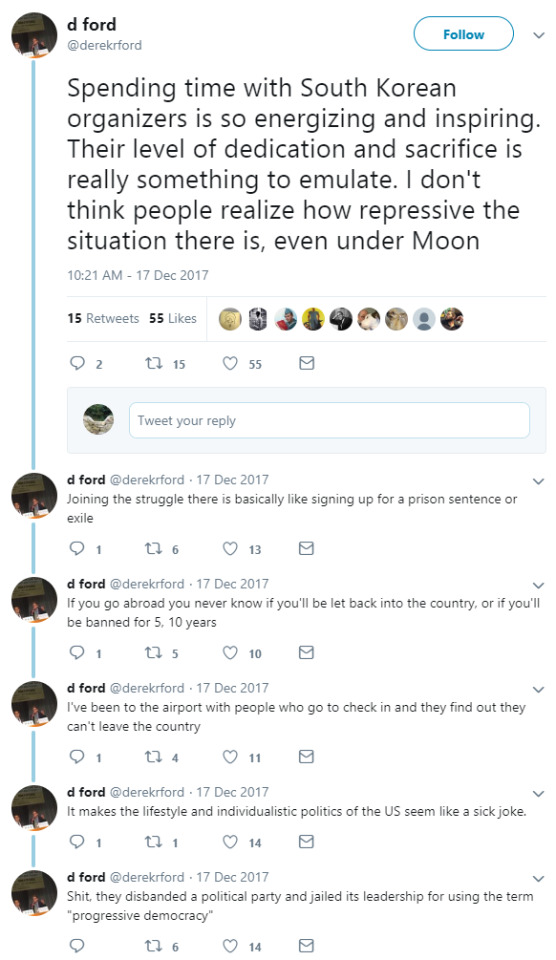
Contrary to Ford’s assertion, the man in the below-pictured tweet (Seo Ok-ryeol) has been out of RoK prison for years. It seems that Ford wanted to use Seo’s plight as an excuse to write the word “Juche” on his timeline.
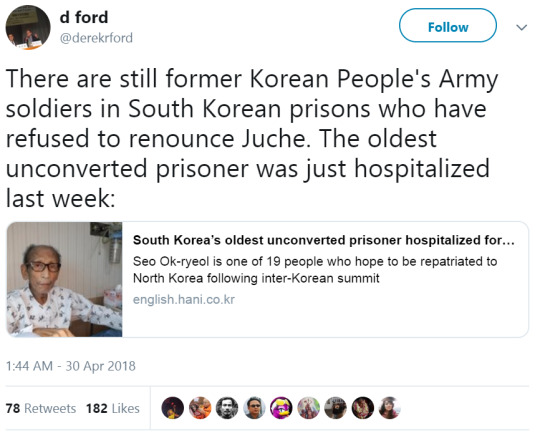
Conclusion: De-Emphasizing the Importance of DPRK Travel Narratives
It’s actually not difficult for USians to travel to DPRK. I haven’t been there myself, but it sounds much more convenient than many other travel destinations. In spite of the currently existing travel ban for US citizens, DPRK is still accepting visitors from the USA, although those visitors may need to exercise caution about publicizing their travels.
On the basis of how easily USians have been able to travel to DPRK, it is imperative that DPRK travel not be confused with DPRK solidarity. Note how Derek Ford refers to his DPRK travel entourage: “a fact-finding delegation.”
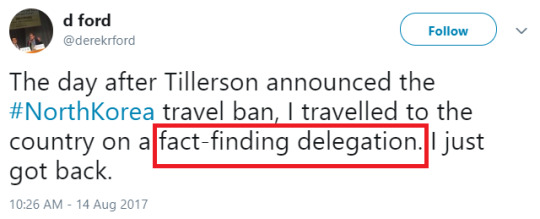
The implication in calling it a “fact-finding delegation” is that Ford may have actually believed imperialist myths about DPRK before he traveled there to “find” the “facts.” Now that he has obtained the facts, he presents himself as an arbiter of those facts based upon his own lived experience. Yet, Ford has repeatedly proven himself unable to present even the most basic facts about the DPRK and Korea at large. Ford’s voice should thus be excluded from any conversation regarding Korea.
Related
Western Academia’s War Against Korea, Part 1: Introduction, Stanford University, Gi-wook Shin
Western Academia’s War Against Korea, Part 2: Stanford University Attempts to Erase the Revolution from DPRK
Western Academia’s War Against Korea, Part 3: Stanford University Celebrates Washington Post Reporter Anna Fifield
#dprk#rok#korea#north korea#south korea#kim il sung#derek r ford#derek ford#with the century#groundings#seo ok-ryeol#disinformation
24 notes
·
View notes
Text
Refuting the Human Rights Watch Report Alleging Rampant Sexual Violence Against Women in DPRK
Introduction
Human Rights Watch recently published a report entitled “You Cry at Night but Don’t Know Why,” which claims that DPRK is suffering an epidemic of gendered violence against women. This report should not be taken seriously for many reasons, one of which is the report’s ridiculous claims about DPRK citizens’ having an insufficient vocabulary to discuss gendered violence.
HRW’s specific claims regarding DPRK citizens’ vocabulary are:
The version of the Korean language used in the North lacks specific vocabulary on sexual and gender-based violence, domestic violence, sexual abuse, assault, and harassment. The North Koreans we spoke with explained that family or domestic violence would have to be rendered as “men who hit their women,” and sexual violence that does not involve penetration with a penis as “violence with sexual connotations.”
They said that North Koreans understand the North Korean word for rape (ganggan) as unwanted vaginal penetration with a penis and accompanying physical violence. According to the North Koreans, sexual abuse or unwanted sexual advances without significant physical violence can be vaguely described as “situations with a sexual undertone when women feel uncomfortable or ashamed.”
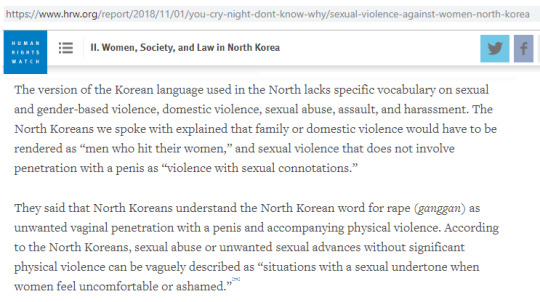
By examining DPRK writers’ usage of a variety of Korean-language vocabulary that relates to gendered violence, one can see that HRW’s claims about DPRK citizens’ vocabularies are totally false. Below, I will briefly survey DPRK writers’ usage of vocabuarly regarding gendered violence, with results categorized by lexical item. This is by no means an exhaustive list of all of DPRK’s gendered-violence terminology and the context of its usage, and many other examples may be found in DPRK texts. I just hope to provide representative examples that disprove HRW’s claims.
DPRK Terminology Related to Gendered Violence
seongchuhaeng (성추행) - rape, sexual assault, severe sexual harassment
A 2013 Rodong Sinmun article used the term "seongchuhaeng" (성추행) to criticize the (alleged) sexual assault committed by Park Geun-hye's spokesman Yoon Chang-jung in a hotel in Washington, DC.
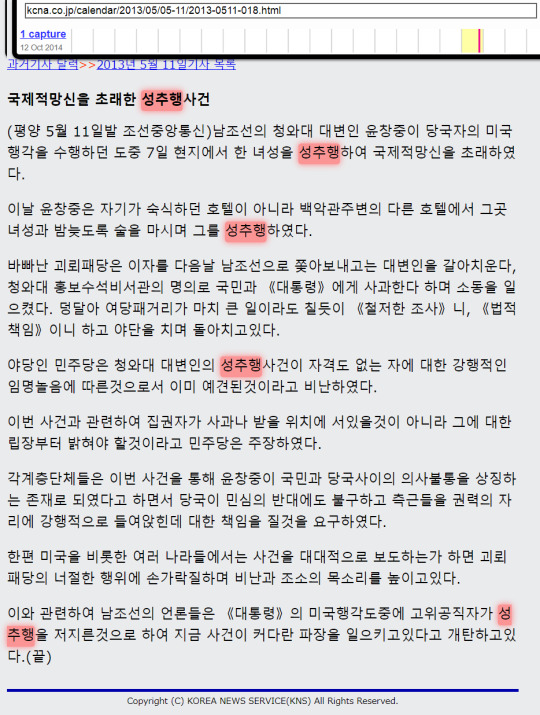
Yoon was accused of groping a young woman’s buttocks and later exposing his naked body to her against her will.
DPRK's Uriminzokkiri dictionary defines "seongchuhaeng" as "rape or serious sexual harassment."

As Yoon’s alleged behavior could easily be described as both sexual assault and serious sexual harassment that isn’t penetrative rape, Rodong Sinmun’s usage of “seongchuhaeng” to describe the crime would be accurate by the standards of the Uriminzokkiri dictionary.
seongpokhaeng (성폭행) - sexual assault
A 2017 issue of DPRK periodical Kumsugangsan (금수강산) describes RoK's women workers as suffering sexual assault (성폭행 / seongpokhaeng) on the job.
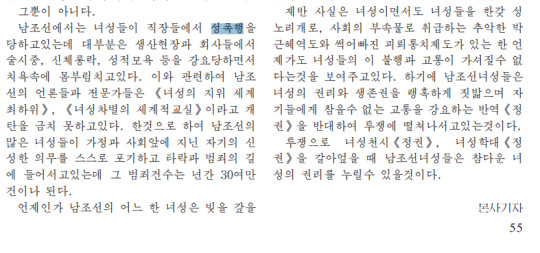
The Uriminzokkiri dictionary defines “seongpokhaeng” as “a violent and coercive [or oppressive] method of having sexual relations.”

Uriminzokkiri’s definition of “seongpokhaeng” corresponds with reports from women in RoK.
ganggan (강간) - rape
A DPRK document from 2016 (중국 동북해방전쟁을 도와 / roughly translated as Aiding in the War to Liberate Northeast China) uses the word rape (강간 / ganggan) to describe crimes perpetrated by the Manchukuo-based Japanese puppets known as the Peace Preservation Corps (치안유지회).
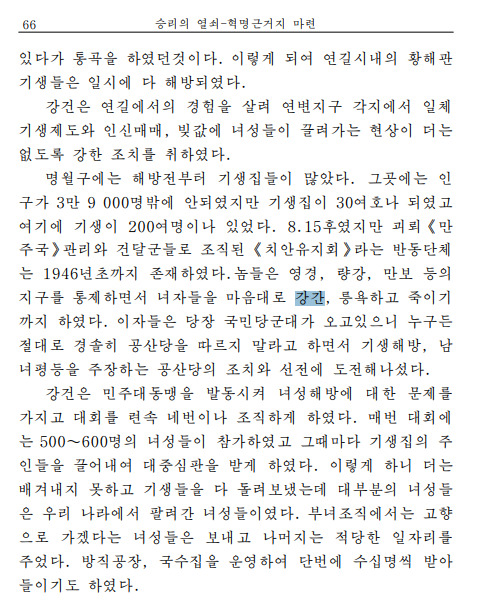
In another DPRK document published in 2016 (미국의 진면모 5: 번영이 아니라 멸망이다 / USA's True Appearance: Not Prosperity but Ruin), rape (강간 / ganggan) is cited as among the crimes plaguing residents of the USA.
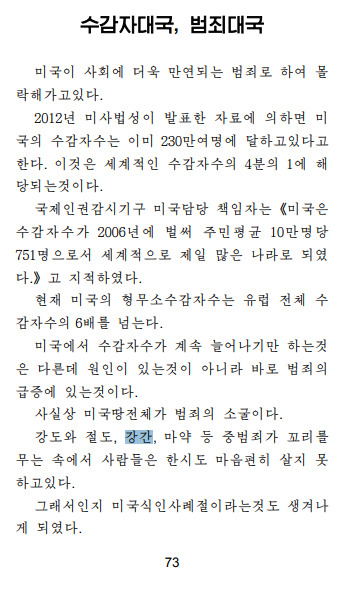
The Uriminzokkiri dictionary defines “ganggan” as “the use of violence, threats, or other forceful measures to have sexual relations with a woman.”

gajeongpongnyeok (가정폭력) - domestic violence
A 2018 article from Rodong Sinmun uses the phrase "domestic violence" (가정폭력 / gajeongpongnyeok) to describe violence suffered by women (particularly married women) in the USA.

Conclusion
According to Human Rights Watch, the above DPRK texts would be incomprehensible to all DPRK citizens who tried to read them, because DPRK citizens don't have the lexical resources to comprehend descriptions of gendered sexual violence. That would be absurd, though. If HRW’s claims were correct, then how would DPRK writers have mustered up the vocabulary to write about gendered violence against women? And why would those writers publish articles that their readers could not read? To take seriously HRW’s claims about DPRK citizens’ vocabularies is to believe in such a bizarre scenario, in which writers transmit words they can’t understand to a readership for whom the words are nothing but nonsense. HRW’s report is obviously a reflection of US-based anti-DPRK propagandists’ bizarre fantasies about life in DPRK, and not a reflection of actual circumstances in DPRK.
#dprk#korea#rok#north korea#south korea#human rights watch#hrw#gendered violence#sexual assault#rape
20 notes
·
View notes
Text


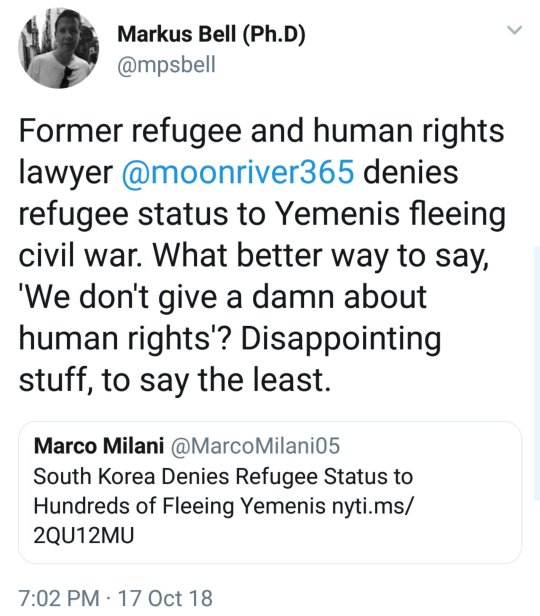

Anglophone "Korea watchers" castigate RoK for not welcoming Yemeni refugees, but they say nothing in protest of the NATO countries (particularly US and UK) that are actually leading the genocidal war on Yemen.
#rok#Korea#Yemen#robert e. kelly#raphael rashid#crystal tai#markus bell#Daniel pinkston#Korea watchers#south Korea#genocide
12 notes
·
View notes
Text
Jerusalem Post and Celebrity Defector Collaborate to Urge War on DPRK
On Oct. 13, 2018, the Jerusalem Post published an interview with a male DPRK defector, surnamed Shim. The interview begins with a description of a melodramatic scenario that often appears in Western media regarding DPRK defectors. Claiming that he fears that his efforts on behalf of freedom and liberty for DPRK will bring reprisals from the DPRK government, "Mr. Shim" demands that the Jerusalem Post not reveal too many of his personal details:
Because of his ongoing involvement with efforts to assist other North Koreans longing for liberty, Mr. Shim has asked that only the sketchiest of details be provided about him and also requested that no photographs of him be published, as he fears potential retaliation by the North Korean government, which has been known in the past to carry out abductions and executions of opponents abroad.

Mr. Shim's conditions: No pictures are allowed, and "only the sketchiest of details" of his life may be conveyed to the readers of the Jerusalem Post. Yet, via the details that are revealed, we can make a connection: Mr. Shim recently gave an interview to the Associated Press, for which he was "proud" to have his picture taken and for which he spoke under his full name: Sim Ju-il. The AP interview came out in September 2018, just one month before Mr. Shim's interview in the Jerusalem Post.
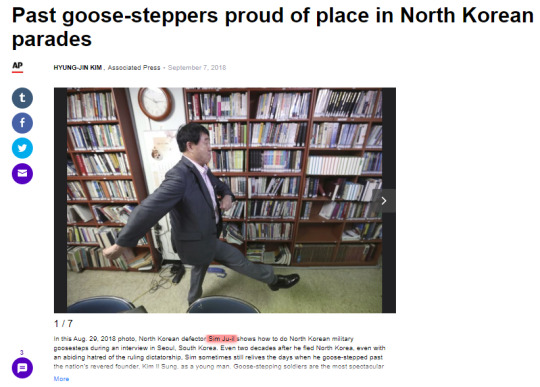
The biographical details of the Jerusalem Post's defector Mr. Shim are identical to those of the defector Sim Ju-il who appears in the AP article: same age; same military rank and service in Pyongyang; same educational record; same defection year. Although the defector in the AP article is surnamed Sim and not Shim, the difference is immaterial. Sim and Shim are interchangeable transliterations of the Korean surname 심, which would be transliterated as Sim via the revised Romanization system, but which is actually pronounced more like Shim.
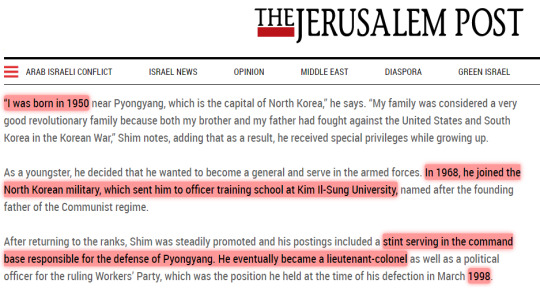
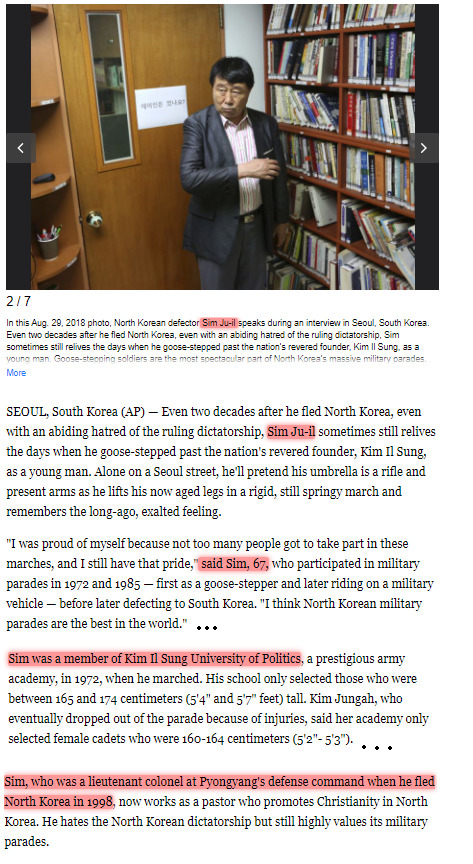
Sim Ju-il is quite active in anti-DPRK media circles in RoK, in which he speaks under his full name and allows himself to be photographed and videoed. He has written under his own name for almost 15 years. The earliest example I could find was this 2004 newsletter from the Youngnak Church in Seoul:
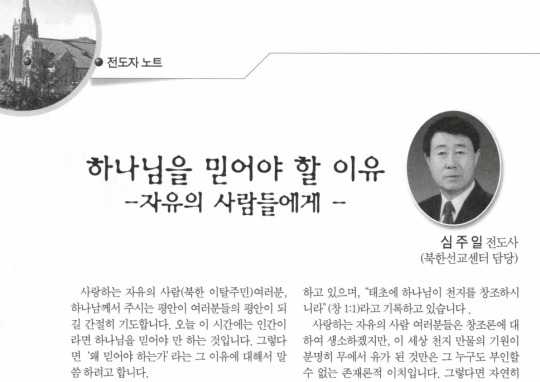
Why, then, would the Jerusalem Post obscure Sim's identity per his request? Sim's primary point about DPRK is that it must be destroyed militarily:
There is no chance that the regime will collapse. I met some American officials on a visit to Hawaii and I told them very clearly: the only way to bring down the regime is with force – and it must be done.
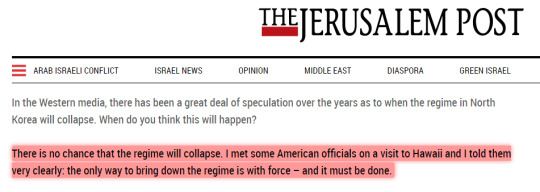
If the Jerusalem Post were to print such a demand for the destruction of DPRK from a defector who spoke under his own name, the demand would seem less credible. This fabricated cloak-and-dagger intrigue, in which "Mr. Shim" is portrayed as a man already engaged in battle with DPRK, serves the narrative that DPRK will never disarm and will always remain a threat until it is annihilated. That narrative is much better delivered by the anonymous fighter "Mr. Shim" than it is by Sim Ju-il, a senior citizen who remains proud of his time spent marching in DPRK parades.
This is yet another example of imperial media's total willingness to print anything that a celebrity defector says, so long as it supports empire's war against DPRK.
45 notes
·
View notes
Text
Western Academia’s War Against Korea, Part 3: Stanford University Celebrates Washington Post Reporter Anna Fifield
Introduction
I posted this picture before in my article “On the Supposed Lack of Diversity in DPRK Media,” but I want to post it again to provide a context in which to begin to examine Stanford University’s bestowing the 2018 Shorenstein Journalism Award upon the Washington Post’s Beijing bureau chief, Anna Fifield.
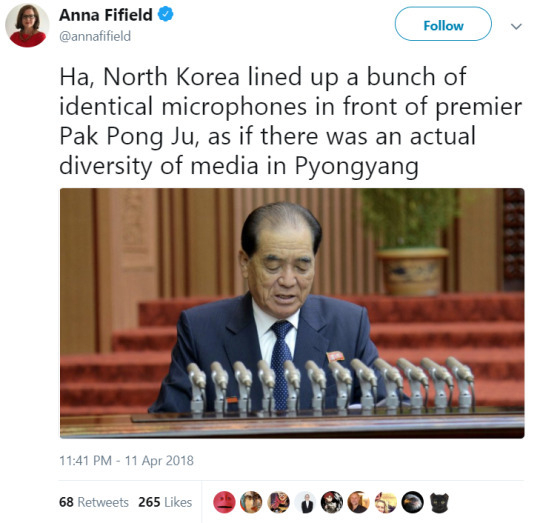
In the above tweet, Fifield is attacking DPRK media over its supposed lack of diversity. Perusing Fifield’s Twitter history for references to DPRK “state media,” one may only conclude that Fifield is contemptuous of the single-hearted unity displayed by the citizen-controlled media of a socialist state. The system that Fifield favors is one in which media clerks dutifully perform a public-relations role on behalf of imperialists. Ironically, although Fifield disparages “state media,” she is an enthusiastic participant in the creation of a US state media, which one can see by examining Fifield’s extensive record of promoting anti-DPRK propaganda outlets funded by millions of CIA dollars.
The National Endowment for Democracy
The “millions of CIA dollars” to which I refer above specifically come from a US government-funded agency known as the National Endowment for Democracy (NED), and it is important to understand the role of NED before one looks at Fifield’s reporting in more detail. One may be tempted to point out that NED and the CIA are not one in the same, but as William Blum says in his book Rogue State, “In effect, the CIA has been laundering money through NED.”
NED was founded in 1983 to rebrand CIA covert activities after a spate of bad press. As then-NED President Carl Gershman said in 1986: “It would be terrible for democratic groups around the world to be seen as subsidized by the C.I.A. We saw that in the 60’s, and that’s why it has been discontinued. We have not had the capability of doing this, and that’s why [NED] was created.”
NED claims to be a "private, nonprofit foundation" with a “nongovernmental character," but as Blum writes: "NGO is the wrong category. NED is a GO." This statement is borne out by NED’s annual report for fiscal-year 2016, in which NED received $179,694,372 from the US government. It received only $1,645,559 from nongovernment sources during the same period.

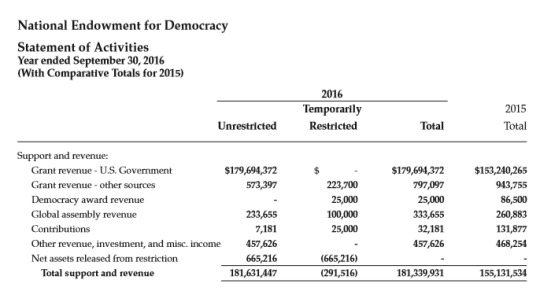
Blum describes NED’s activities and the anti-socialist motivation behind them:
In a multitude of ways, NED meddles in the internal affairs of numerous foreign countries by supplying funds, technical know-how, training, educational materials, computers, faxes, copiers, automobiles, and so on, to selected political groups, civic organizations, labor unions, dissident movements, student groups, book publishers, newspapers, other media, etc. NED typically refers to the media it supports as “independent” despite the fact that these media are on the US payroll.
NED programs generally impart the basic philosophy that working people and other citizens are best served under a system of free enterprise, class cooperation, collective bargaining, minimal government intervention in the economy, and opposition to socialism in any shape or form. A free-market economy is equated with democracy, reform, and growth; and the merits of foreign investment in their economy are emphasized.
Even NED’s founders admit that NED is the spawn of the CIA. Per Blum, "Allen Weinstein, who helped draft the legislation establishing NED, was quite candid when he said in 1991: 'A lot of what we do today was done covertly 25 years ago by the CIA.'"
Anna Fifield Pays the Dividend on NED’s $5.4 Million Investment
Anna Fifield’s “journalism” for the Washington Post has promoted anti-DPRK propaganda organizations that have received a total of at least $5.4 million from the National Endowment for Democracy since 2014. Of course, Fifield almost never discloses NED's financial ties to these groups.
Citizens’ Alliance for North Korean Human Rights
In August 2014, Fifield promoted Citizens' Alliance for North Korean Human Rights, which has received at least $1,155,000 from the National Endowment for Democracy since 2014. The Citizens' Alliance-NED relationship began in 2014 if not before.
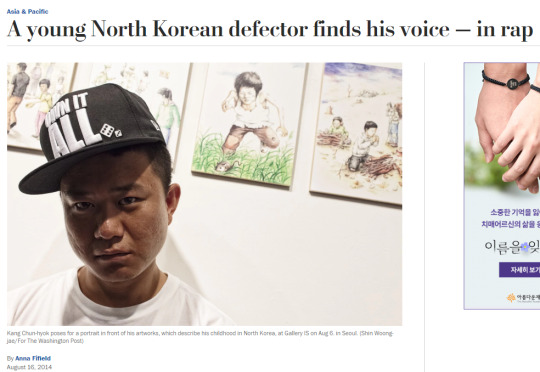
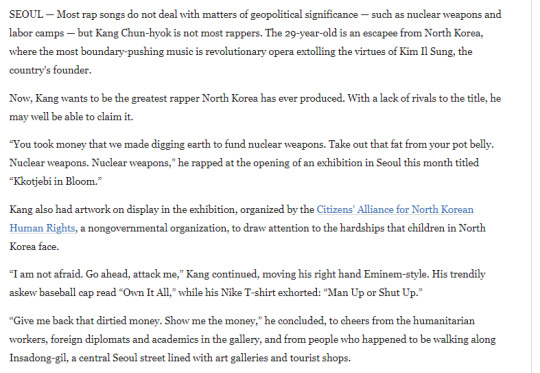
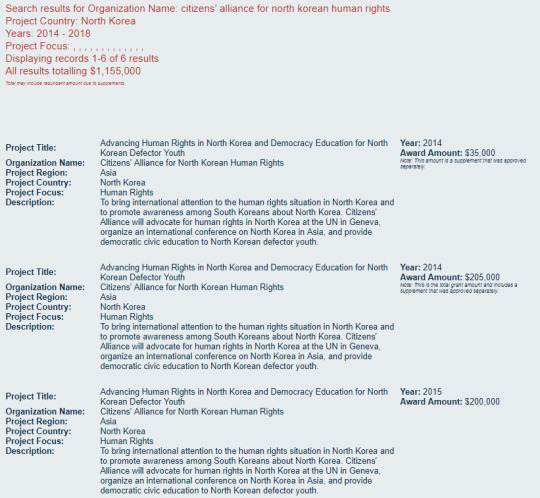
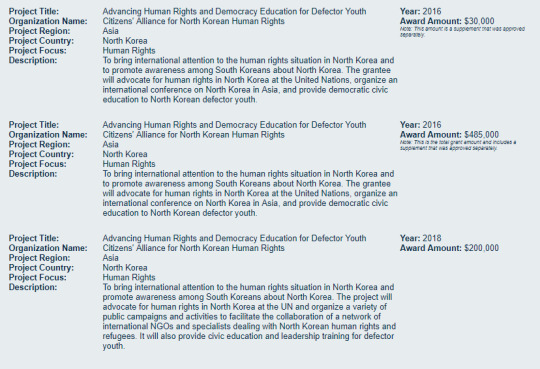
The Daily NK
The absurd level of support that Fifield has shown for anti-DPRK disinformation outlet The Daily NK is impossible to quantify. The Daily NK has received at least $1,185,000 from the National Endowment for Democracy since 2014.
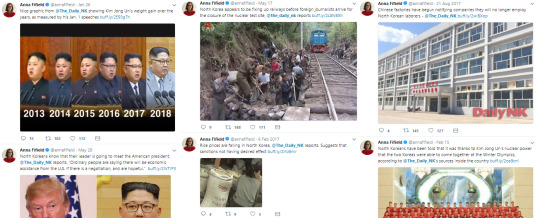
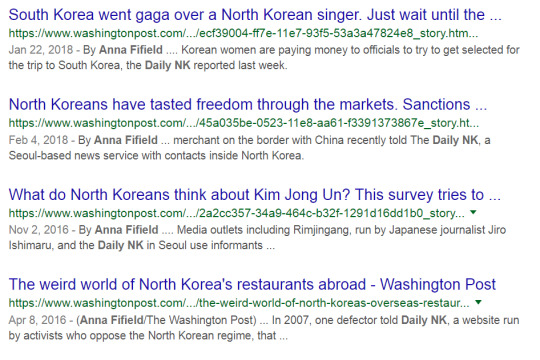
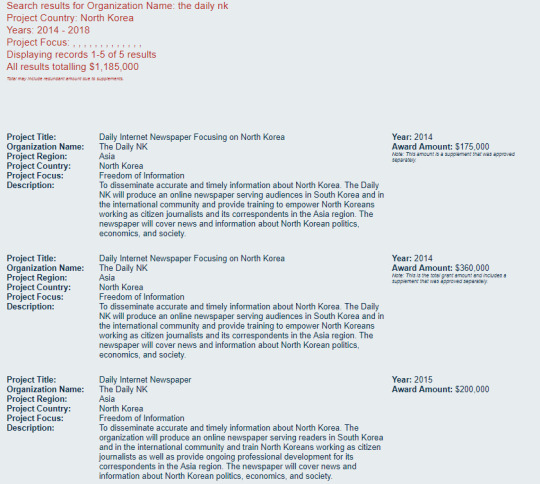
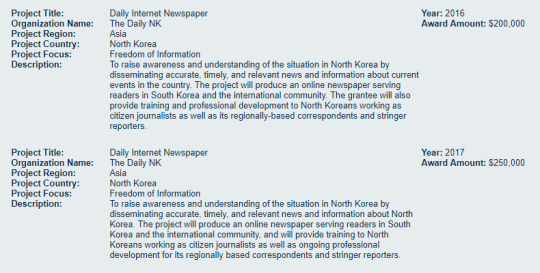
Unification Media Group
The parent company of Fifield-promoted The Daily NK is Unification Media Group, which has received $2,120,000 from the National Endowment for Democracy since 2014.
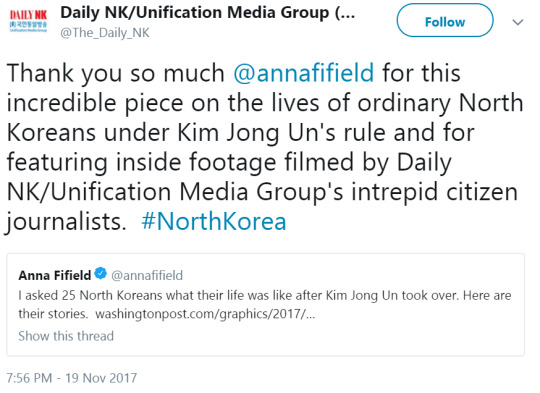
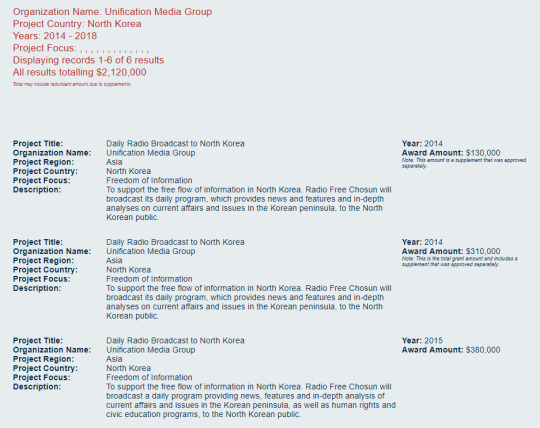
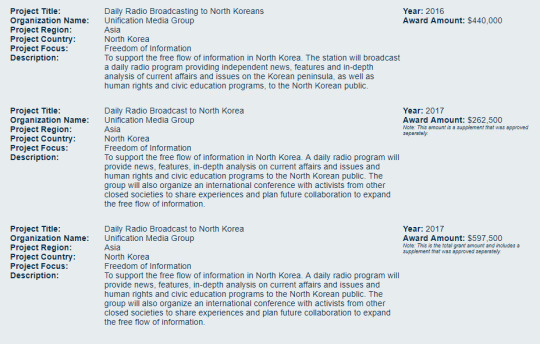
HanVoice Support Association
In November 2017, Fifield promoted an affiliate of HanVoice Support Association, which has received at least $38,319 from the National Endowment for Democracy since 2017. The HanVoice-NED relationship began in 2017 if not before.
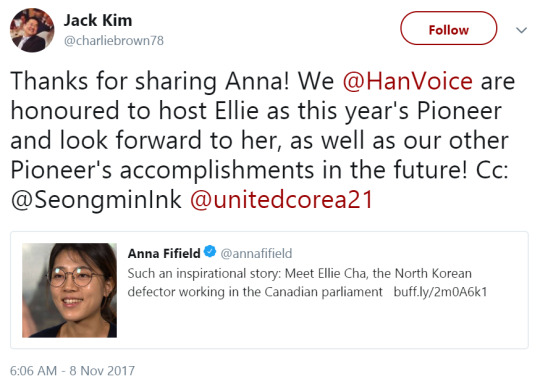
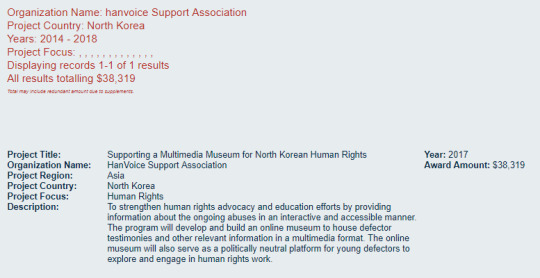
North Korea Strategy Center
In September 2016, Fifield promoted North Korea Strategy Center, which has received at least $130,000 from the National Endowment for Democracy since 2014. The North Korea Strategy Center-NED relationship began in 2014 if not before.
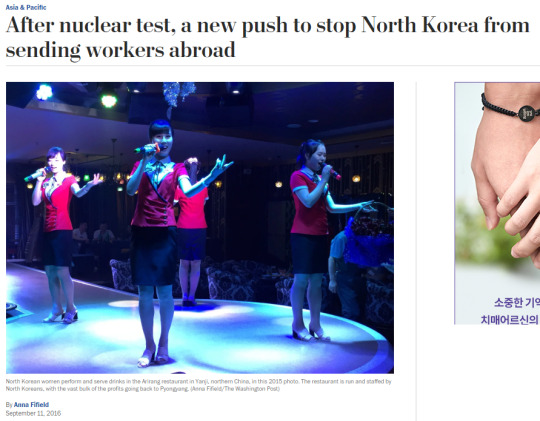
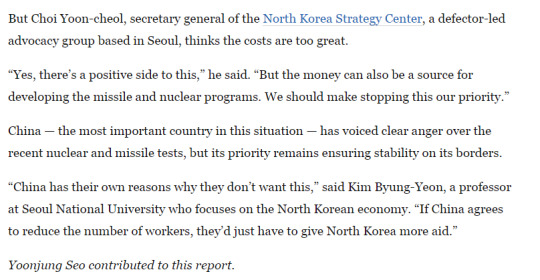
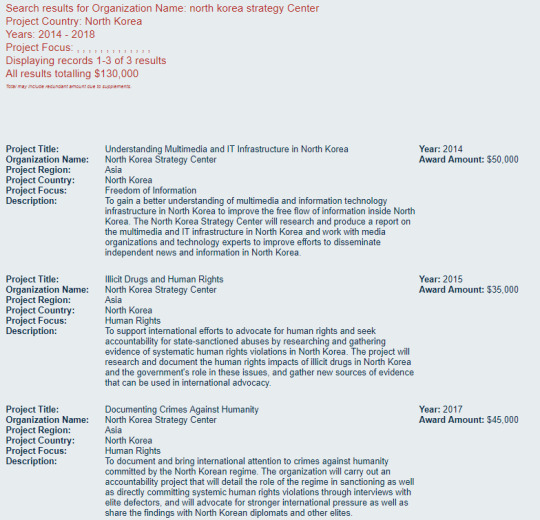
Transitional Justice Working Group
In July 2017, Fifield promoted Transitional Justice Working Group, which has received at least $398,781 from the National Endowment for Democracy since 2015. The Transitional Justice Working Group-NED relationship began in 2015 if not before.
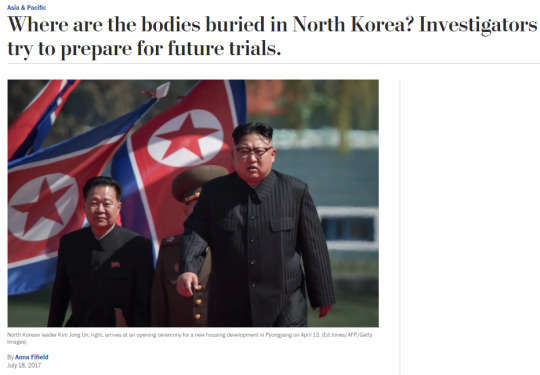
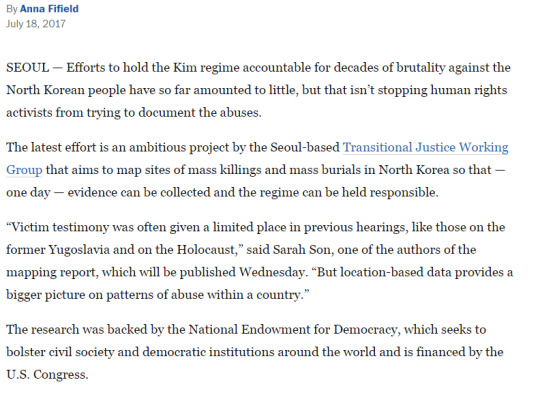
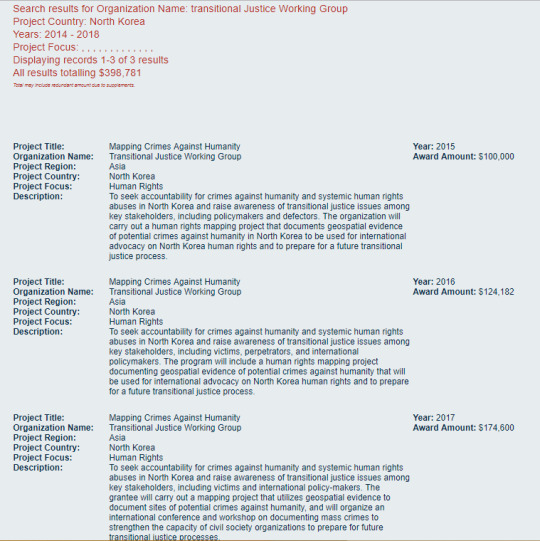
Unity Bridge of Woorion, AKA Woorion
In August 2018, Fifield promoted Unity Bridge of Woorion, AKA Woorion, which has received at least $30,000 from the National Endowment for Democracy since 2017. The Woorion-NED relationship began in 2017 if not before.
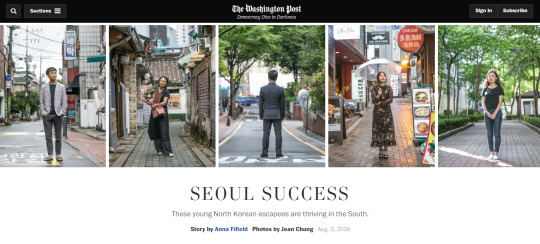
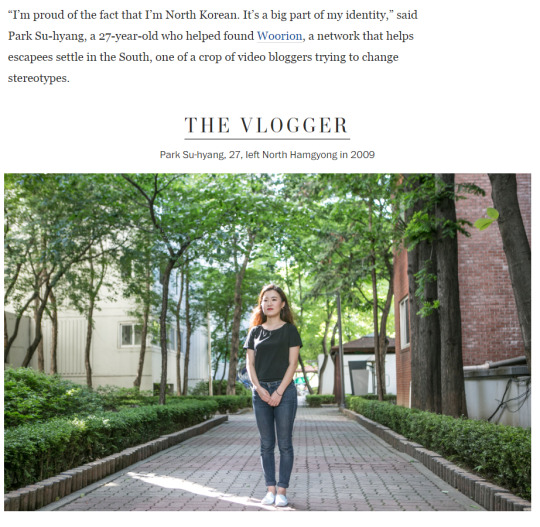
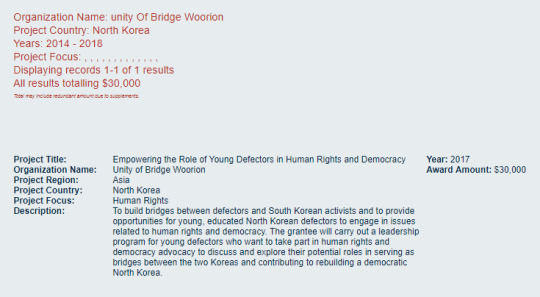
Now Action and Unity for Human Rights
In January 2018, Fifield promoted Now Action and Unity for Human Rights, which has received at least $383,000 from the National Endowment for Democracy since 2014. The Now Action-NED relationship began in 2014 if not before.
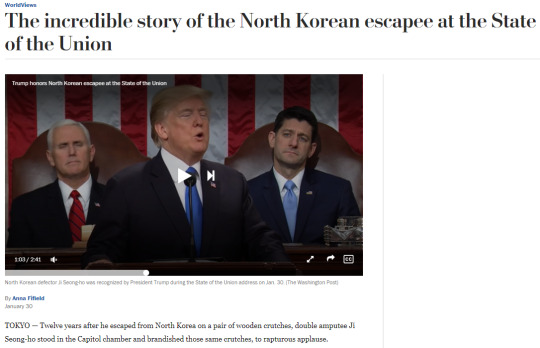
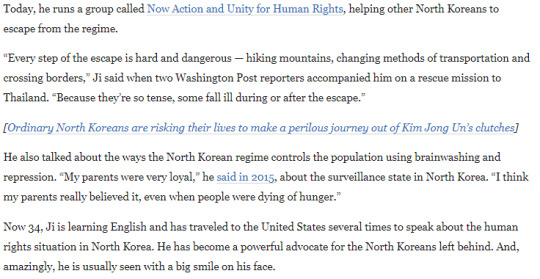
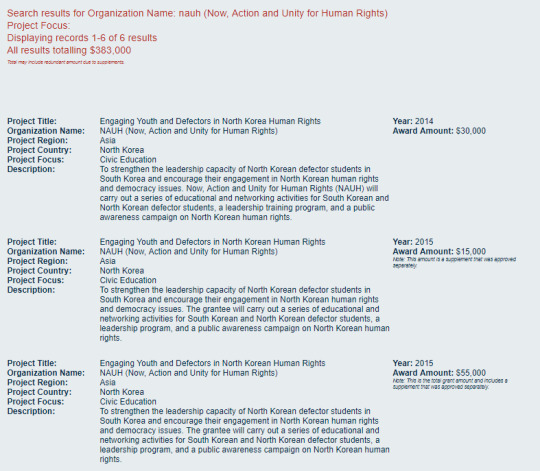
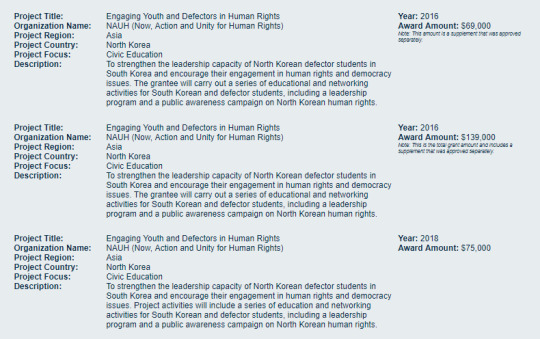
Conclusion
Stanford University’s celebration of Anna Fifield is exemplary as a nexus of anti-DPRK propaganda, academia, and intelligence agencies. Stanford has taken at least $2 million from RoK’s National Intelligence Service. Fifield’s reporting at the Washington Post has promoted anti-DPRK organizations that have taken at least $5.4 million from the US government. In the relationship between Stanford and Fifield, we can see how empire’s disinformation producers work to boost and legitimize each other, and we can get some sense of the price that empire assigns to its disinformation campaigns. We can also see that Fifield’s attacks on DPRK state media are meant to obscure the role that she and so many other Western media clerks play in the construction of USA’s own state media.
Related
Western Academia’s War Against Korea, Part 1: Introduction, Stanford University, Gi-wook Shin
Western Academia’s War Against Korea, Part 2: Stanford University Attempts to Erase the Revolution from DPRK
#anna fifield#dprk#rok#korea#north korea#south korea#national endowment for democracy#ned#woorion#now action for unity and human rights#the daily nk#Unification Media Group#transitional justice working group#north korea strategy center#stanford university#hanvoice support association#citizens' alliance for north korean human rights
24 notes
·
View notes
Text
DPRK Doesn’t Ban Love Stories in Films and Literature
Although one or two Western media clerks have acknowledged the lies that form the basis of celebrity defector Yeonmi Park’s testimony about her life in the DPRK, Park typically receives worshipful credulity from the vast majority of Western “journalists” who write about her.
In a recent example of such fawning coverage — a September 2018 National Review article titled “Love and North Korea” — Jay Nordlinger tries to contextualize Donald Trump’s statement that he and Kim Jong Un “fell in love” by repeating Yeonmi Park’s false claims that the DPRK has banned and continues to ban love stories in films and literature.
[Yeonmi Park] saw the movie Titanic, in a bootleg copy. This movie not only tells the story of the famous tragedy at sea. It invents a love story between a young man named Jack and a young woman named Rose. In the end, Jack sacrifices his life for Rose.
Yeonmi was stunned. In North Korea, there were no love stories. “There is no Romeo and Juliet,” as she says. The only “love” is for the Communist party and the Kims. There is nothing more honorable than to die for the Kims. Dying for another person — someone you genuinely love — is unthinkable. As she watched the movie, Yeonmi wondered whether the director and actors would be killed. The movie was a criminal act, in North Korean terms.

Yeonmi Park isn’t actually the first celebrity defector to say that the DPRK has banned love stories. Film director Shin Sang-ok, who defected from RoK to DPRK and then back to RoK, made that claim many times before his death in 2006. Specifically, Shin boasted that, during his time in the DPRK, he had directed DPRK's first cinematic love story, which was also DPRK’s first film with the word "love" in the title and script. All of those claims are false.

RoK’s Tongil News in 2009 debunked director Shin's lies about the word "love" in DPRK films, counting at least five DPRK films with the word "love" in their titles that came out before Shin's Love, Love, My Love came out in 1984.

For example, 1982 DPRK film Song of Love depicts a love story between main characters Hyeon-u (a hockey player) and Ok-ju (a nurse), who are on a date in the scene pictured below. This film alone disproves the lies of both Shin Sang-ok and Yeonmi Park regarding DPRK and love stories. Additionally, although Shin himself put out many false statements regarding Love, Love, My Love, the existence of that film does disprove Park’s claims about the prohibition of love stories in the DPRK.

Furthermore, although Yeonmi Park claims that "There is no Romeo and Juliet" in DPRK, a 2001 article from RoK’s Kyunghyang Shinmun examines DPRK scholars' views on Shakespeare plays and notes that DPRK translators had rendered Romeo and Juliet’s "Friar" Lawrence as "Monk" Lawrence in Korean.

If, as Yeonmi Park tells us, "There is no Romeo and Juliet" in DPRK, then it would have been impossible for DPRK translators to obtain English copies of the play or for DPRK literature scholars to analyze the play. Obviously, Park is lying — as usual.
#yeonmi park#park yeonmi#park yeon-mi#박연미#dprk#rok#korea#north korea#jay nordlinger#national review#shin sang-ok#신상옥#사랑의 노래#romeo and juliet
139 notes
·
View notes
Text
If you want to work in Alistair's office, you'll have to fulfill a foreign-language-comprehension requirement that Alistair himself is unable to fulfill.


Typical Western misogyny from Alistair Coleman, a white man who speaks absolutely no Korean yet somehow has a BBC job as a “Korea expert.” He presents a blurry picture of Kim Yo Jong simply standing there and criticizes her as “swanning about.” Women aren’t allowed to stand, apparently.
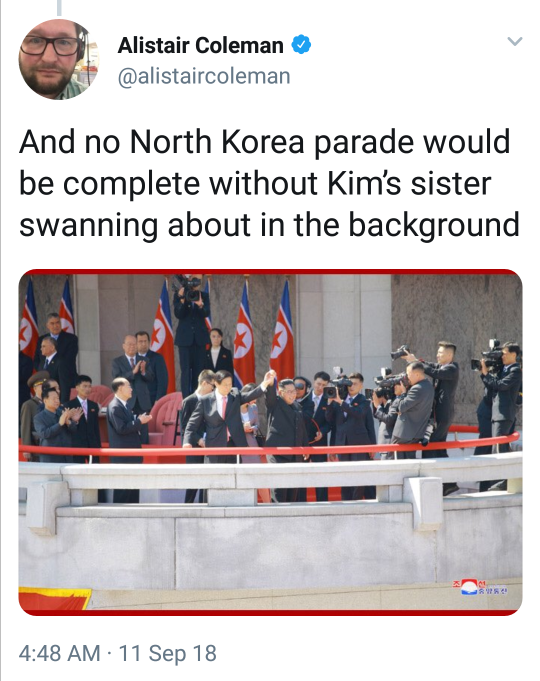
The self-described Korea expert: “I don’t have the patience for language learning. I might find time to learn some Korean next month.”



402 notes
·
View notes
Text
DPRK Defector Narratives in English Are Created by and for the West
The vast majority of DPRK defectors are female victims of human trafficking, but this upcoming Korea Economic Institute of America panel on defectors comprises 3 white men only, one of whom (Christopher Green) is a former manager at CIA mouthpiece The Daily NK.

For an example of how the West shapes defector narratives, consider how the New York Times reported the story of ex-defector Lim Ji-hyun, who returned from RoK to DPRK in 2017. Attempting to shine a positive light on Lim’s life in RoK, the Times reports that Lim "lived in a small one-room studio in Seoul." However, in truth, she lived in a glorified closet called a goshitel; the only dining utensil she owned was a mug.
According to this photo-essay, goshitels are places "where mostly the poor seek refuge ... Living in a goshitel [is] synonymous w/being poor, overworked, cut off from society. Many [residents are] driven to develop hatred towards their country or themselves."

A “room” in a goshitel
For another example of a defector narrative shaped by the West, consider the case of the 12 female DPRK restaurant workers kidnapped from Ningbo, China, in 2016 by RoK’s National Intelligence Service. Although the DPRK has always maintained that the workers had been kidnapped, Western media rejected DPRK’s testimony in favor of a bogus story that the women had taken part in the largest group-defection ever. Only after the restaurant’s manager himself confirmed that the workers were kidnapped by NIS did Western media begin to report the story as DPRK had told it all along — albeit with great skepticism.
#dprk#rok#korea#north korea#south korea#defectors#christopher green#the daily nk#cia#ningbo#korea economic institute
398 notes
·
View notes
Text
Lies and Mistranslations of “Noon In Korea”
This lengthy post will collect some of the lies and mistranslations from Noon In Korea, an anti-DPRK disinfo dump that has been heavily promoted by blue-check verified Twitter accounts and "Korea watcher" celebs (pictured below). All those who promoted Noon In Korea are total hacks who don't know enough about their field of specialization to spot an obvious fake — or they’re in on the scam.
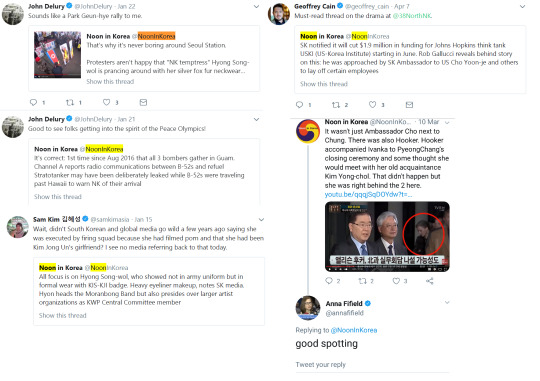

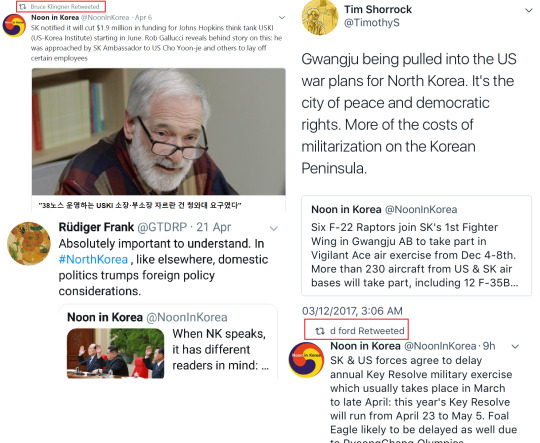
1. Noon In Korea falsely claims that DPRK "athletes don't talk about family, only DPRK, Juche and KJU" in interviews. However, in an interview with China's CCTV News, DPRK ping-pong player Kim Hyeok-bong says that he wants his son to become a ping-pong player.
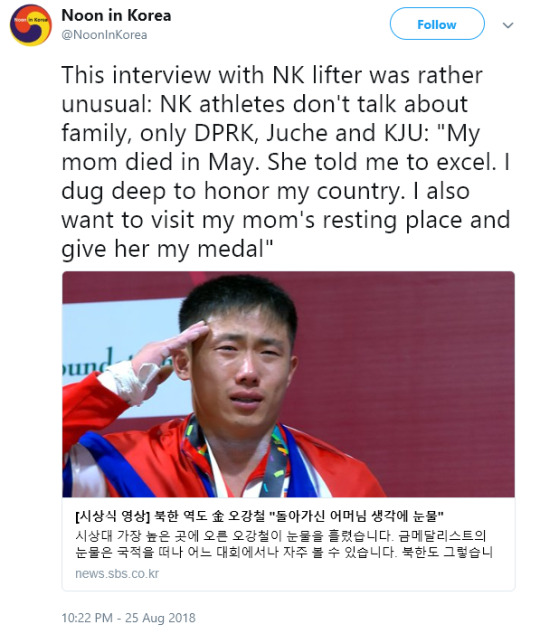
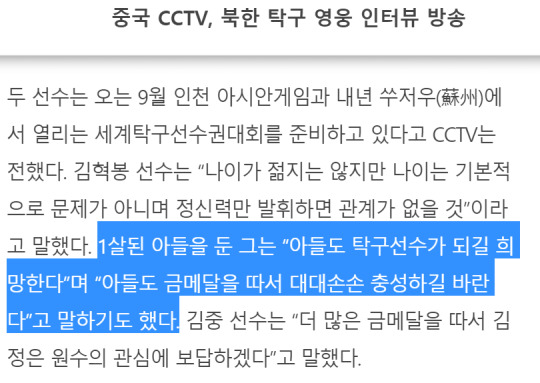
In this interview with Sports Seoul, DPRK women's soccer team player Seung Hyang-sim discusses her family, saying that her parents exercise well but aren't pro athletes. She also says that she wants to become famous.
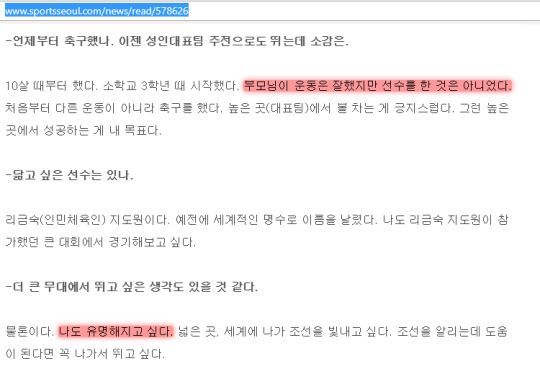
2. Noon In Korea claims that DPRK's DMZ soldiers had never seen cigarette lighters even in the mid-1990s and links a video as proof. However, at no point in that video does anyone tell such a story. (Original video has been taken down, but I watched it twice when it was up.)
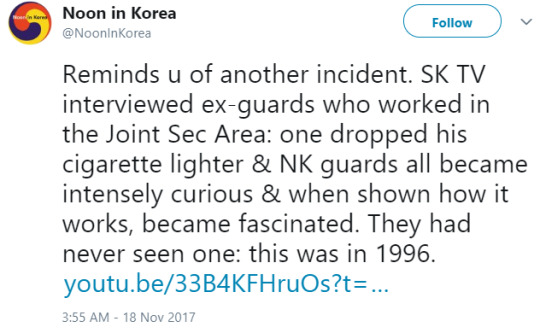
If a DPRK defector's testimony appearing on Chosun Ilbo's website can be believed, in the 1980s, RoK often lofted cigarettes, lighters, pantyhose, snacks and candy across the DMZ. In the 1990s, RoK leaflets covered the ground like snow.
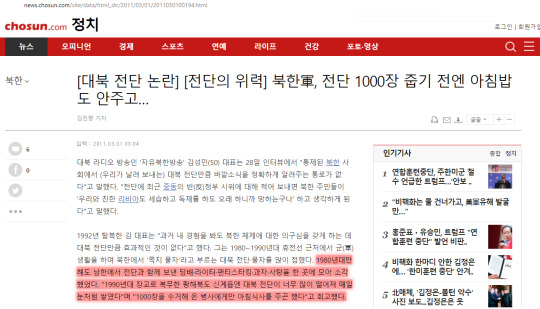
Noon In Korea constantly claims that DPRK is a "surveillance state," yet expects readers to believe that DPRK's DMZ troops had never managed to conduct surveillance on their immediate surroundings and catch a glimpse of RoK soldiers using cigarette lighters.
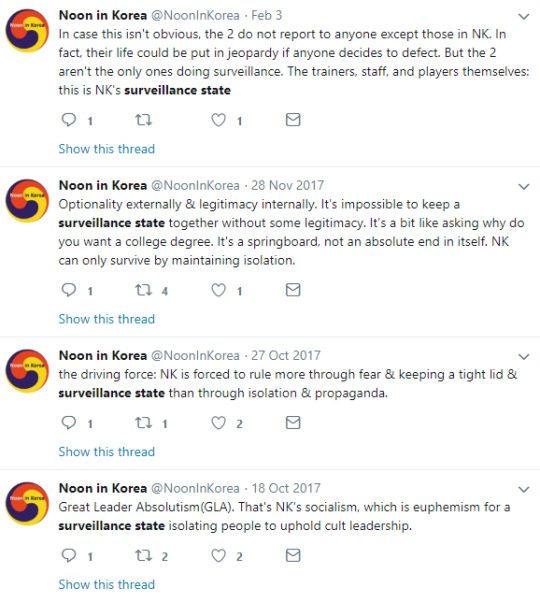
3. Noon In Korea mistranslates Kim Jong Un's words re RoK musicians' April 2018 Pyongyang concert and later brags on its erroneous translation. KJU didn't say that DPRK citizens "tried" to understand RoK music. He concretely says that they did understand it, no element of "try."
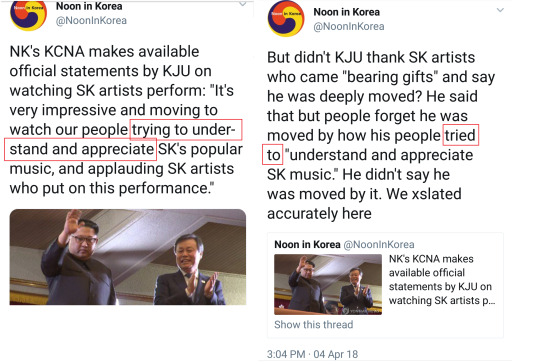
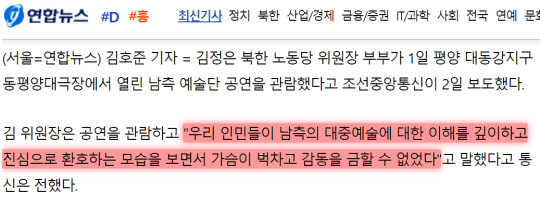
With this mistranslation, Noon In Korea was trying to downplay the importance of the concert and imply some kind of essential difference between DPRKians and RoKians, i.e., DPRKians tried to understand but couldn't.
4. Noon In Korea claims that DPRK grows apples in greenhouses, citing no source. Growing apples in greenhouses is referred to as "nearly impossible" by experienced farmers and would seem to be a waste of resources considering that DPRK already grows other fruits in greenhouses.
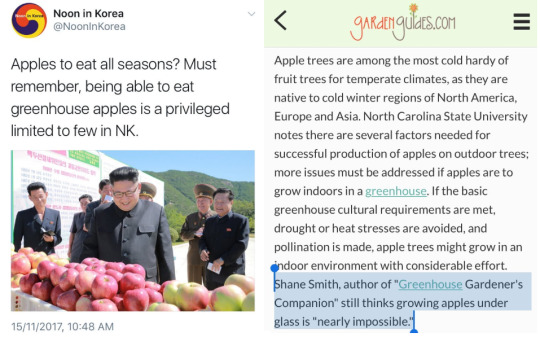
5. Noon In Korea claims that DPRK restaurant workers who were kidnapped from Ningbo, China, in 2016 can simply fly to Beijing if they want to go back to DPRK. This ignores RoK's precedent of denying passports to forcibly naturalized ex-DPRK citizens who wish to return to DPRK.
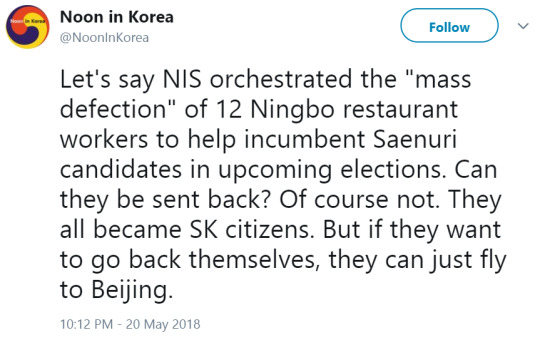
For example: Jeong Sun-taek, who was forcibly naturalized as an RoK citizen after spending decades in prison due to being convicted as a DPRK spy, wasn't eligible for a passport and couldn't travel outside RoK without govt permission.
Even now, only two of the restaurant workers have received RoK passports, and it is unclear whether they can actually use those passports to travel.
6. Noon In Korea concocts a quotation and attributes it to former Vietnamese ambassador to DPRK Pham Tien Van. The quotation about Doi Moi's having been instituted from "grassroots and bottom up" is NiK's embellishment of an RoK journalist's purported paraphrasing of Van's words.
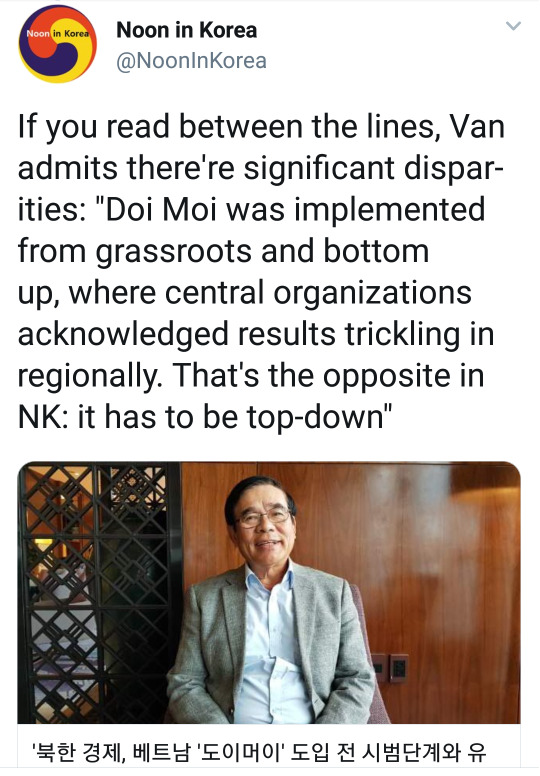

The RoK's journalist's paraphrasing is based on his misunderstanding of Doi Moi's implementation. The journalist and Noon In Korea seem to portray Doi Moi as a caricature of populist "people power" that Vietnam's govt was forced to acquiesce to.
I'm not an expert on Doi Moi, but it seems to have been centrally planned and implemented. In any case, the quotation re "grassroots and bottom up" is a fabrication.
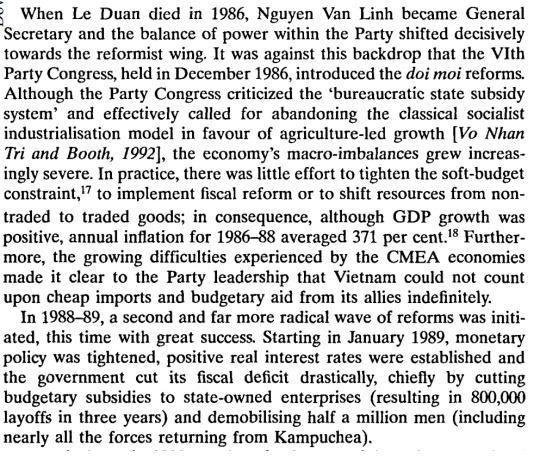
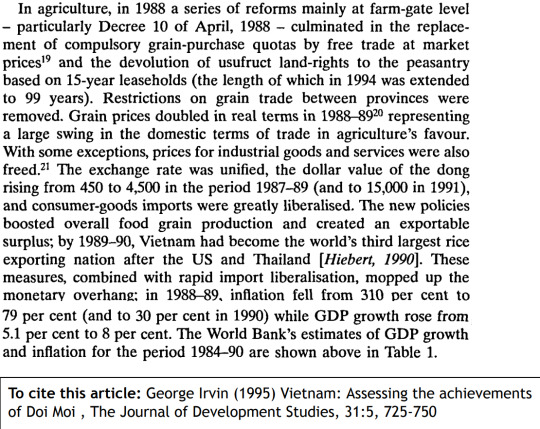
7. Noon In Korea contradicts itself re DPRK citizens' (un)willingness to speak to RoK media. They link a video that shows DPRK citizens who are unwilling to speak to US puppet Channel A news. NiK notes ominously, "They know well the consequences of interacting with S Koreans."
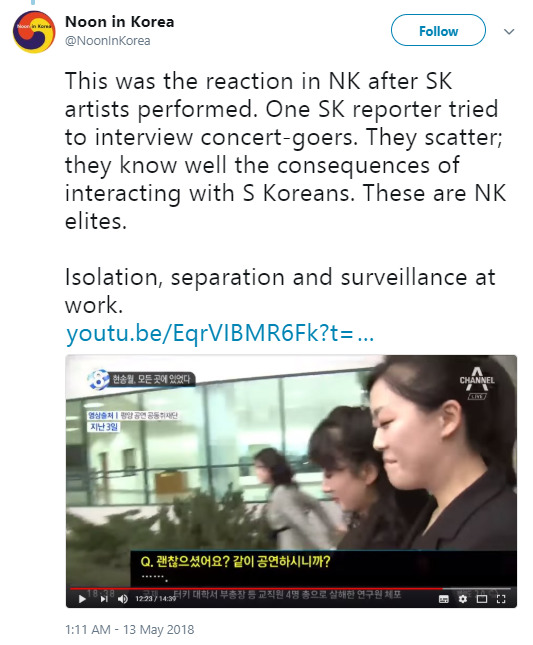
Yet Noon In Korea also posts a video of a DPRK journalist freely speaking to RoK journalists on camera in Beijing. Does he not "know well the consequences of interacting" w/ RoKians? Or is it actually that there are no consequences? (It's the latter: There are no consequences.)
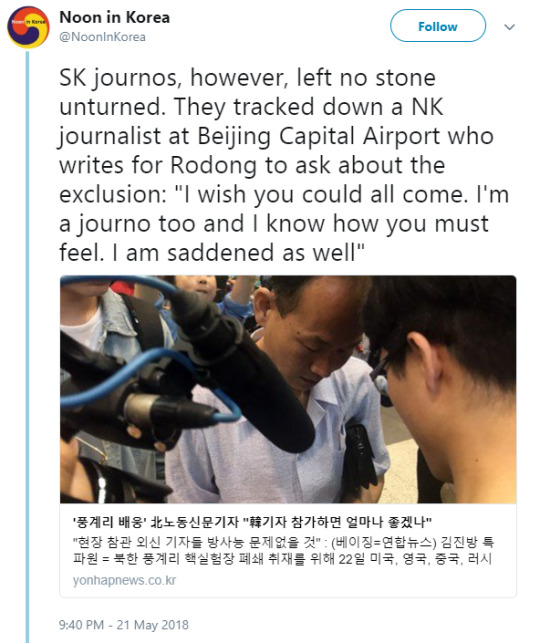
8. Noon In Korea's coverage of Moon Jae-in's use of the Korean-language euphemism "looking for scorched-rice water at a stone well" is factually inaccurate and reveals that NiK's operators have never lived in Korea.
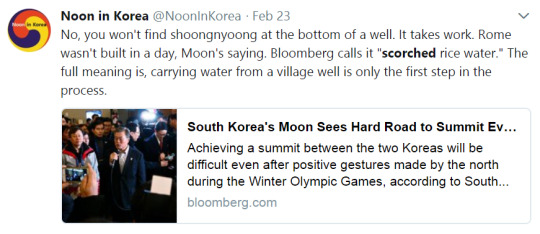
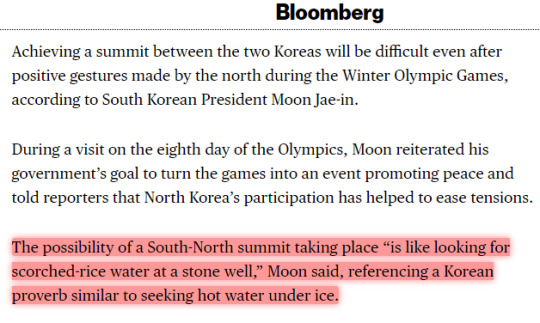
Referring to scorched-rice water (known as sungnyung in Korean [숭늉]), NiK asks, "Do people still eat this stuff?" They answer their own question: "Not really." This is 100% false. Sungnyung is served in thousands of Korean restaurants and dining facilities every day.
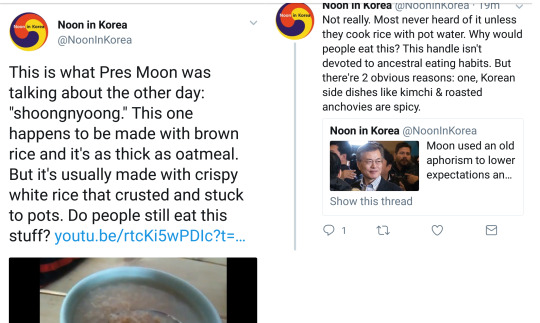
I wouldn't even classify it as an old-fashioned food. It often appears on menus at elementary, middle and high schools. Chain restaurants serve it. (4th image is pics of sungnyung from one chain, LA BukChangDong [LA 북창동])
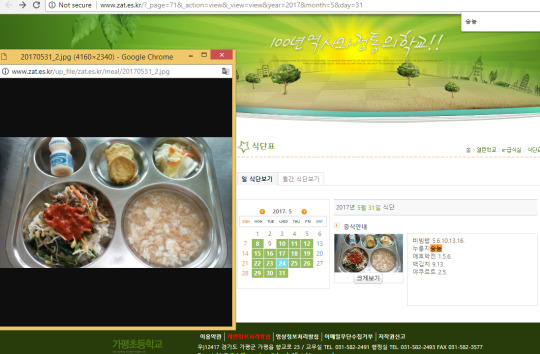
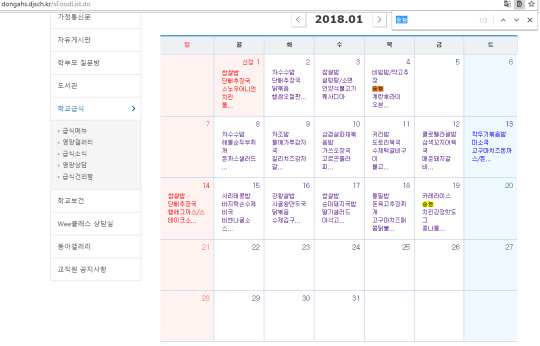
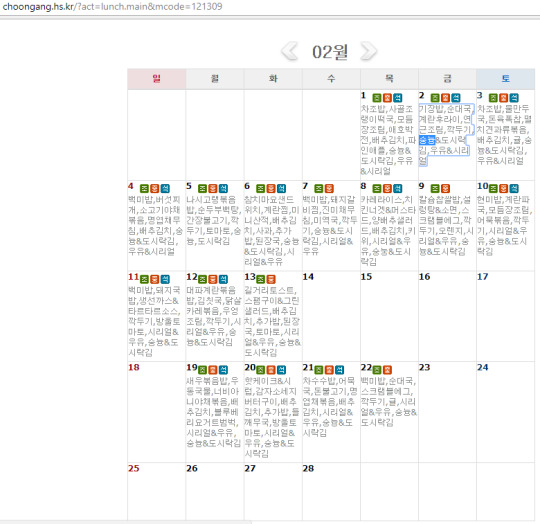
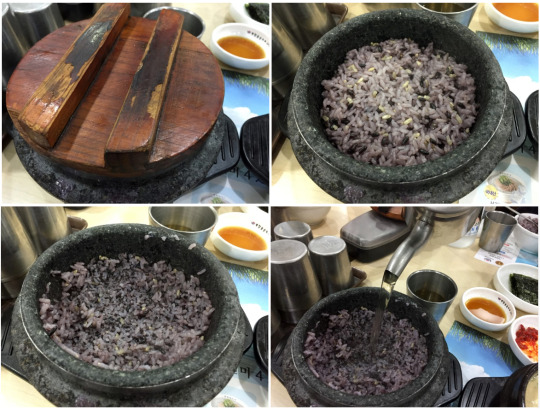
9. Noon In Korea claims that DPRK has "banned" its own citizens from fishing in its territorial waters. This is false. Although DPRK has accepted payment in exchange for allowing Chinese boats to fish off its coasts, it has never prohibited DPRK fishermen from fishing there as well.
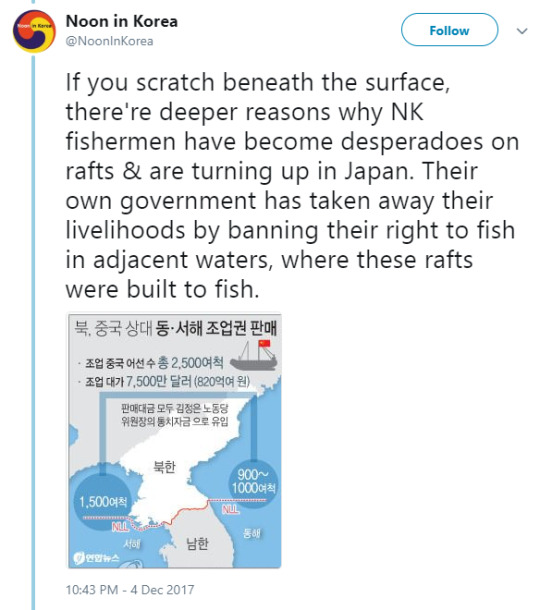
10. Noon In Korea refers to a DPRK boat as being named "Mankyongbong Ho." Although NiK purports to employ native speakers of Korean, this error reveals deep ignorance re basic protocols for reporting vessel names in Korean language. "Ho" is not part of the boat's name.
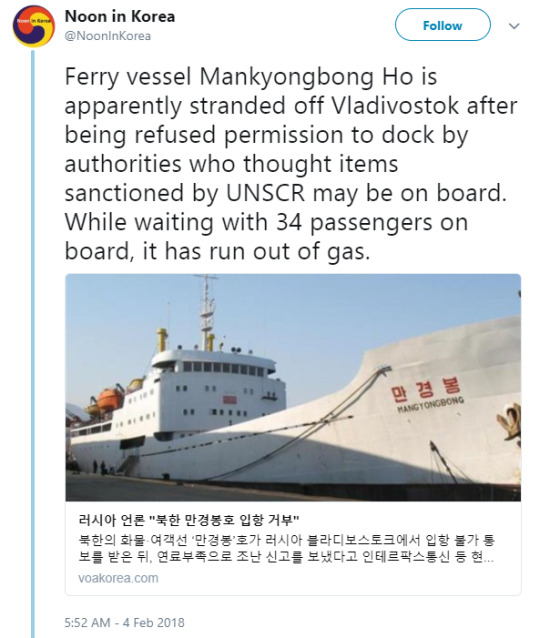
In Korean, "ho" is just a syllable that follows the name of a boat to demarcate the vessel's name (likely because many vessel names are foreign-language words transliterated into Korean). You can see it in the below-picture Korean dictionary entry: "Titanic ho."
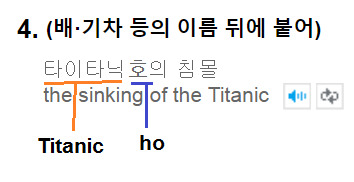
11. Based on no evidence at all, Noon In Korea claims that DPRK's Moranbong Band wears clothing made of dog fur. This is clearly meant to smear DPRK by taking advantage of Western stereotypes re treatment of dogs in Korea.
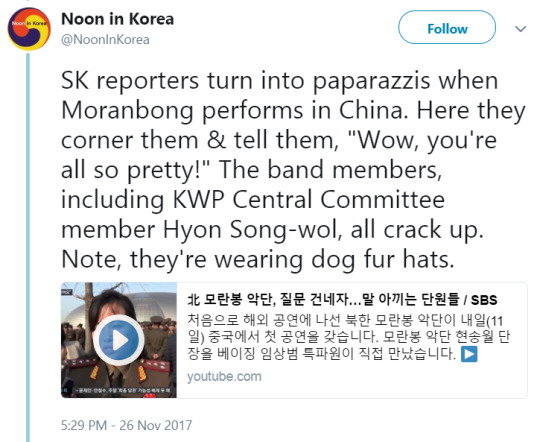
12. Related to No. 11: Noon In Korea promotes "sources claiming to be familiar" w/ Pyongyang restaurant Ok Ryu Gwan to boost a myth that Ok Ryu Gwan uses dog meat to flavor its soup broth. NiK doesn't mention that the sources are two anonymous old people who left Pyongyang in the 1950s.
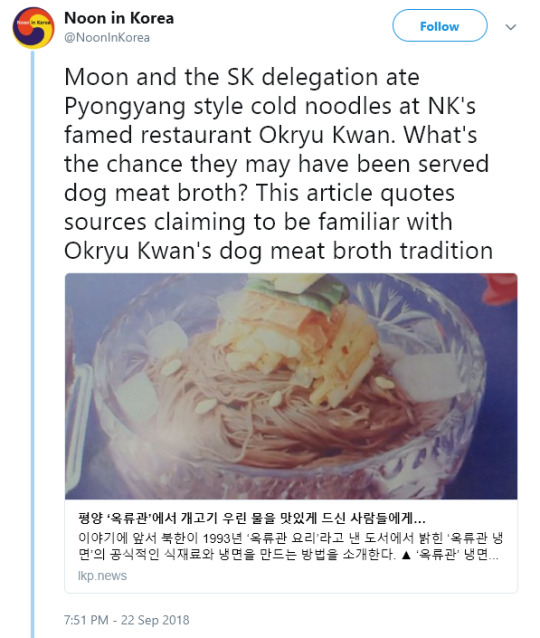
The anonymous old couple's tale appears on the Liberty Korea Post, the same website that posted a completely made-up conversation between Kim Jong Il and Kim Dae Jung. The dog-meat story's author claims to have heard the old couple's story in the 1970s. The story is not credible.

In an attempt to bolster the Liberty Korea Post story, Noon In Korea posts a video and claims that it shows "defectors said to be knowledgeable about Okryu Kwan." However, the video is from Lee Ae-ran, Liberty Korea Post's publisher. It's just the same article, only in video form.
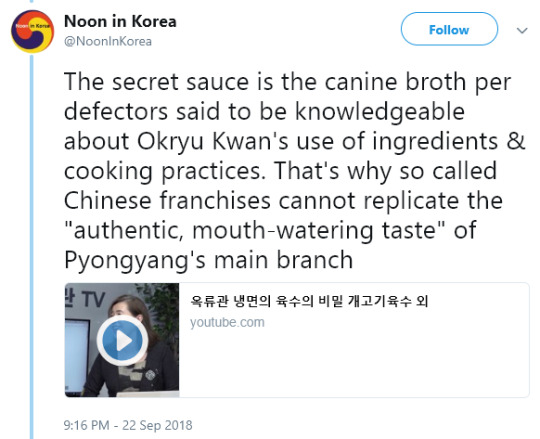
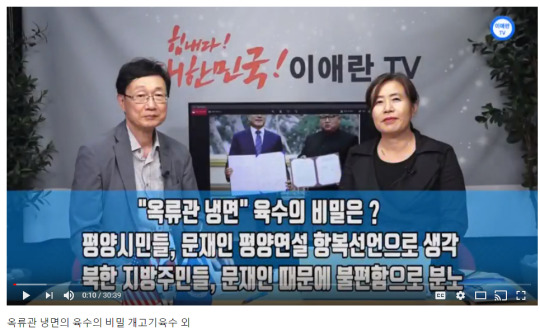
13. Noon In Korea displays deep misogyny toward women of DPRK, particularly Ri Sol Ju (whom they describe as once looking “rough around the edges”) and Kim Yo Jong. Kim Yo Jong is married, has a child, works hard, but NiK continually refers to her as a teenage girl.
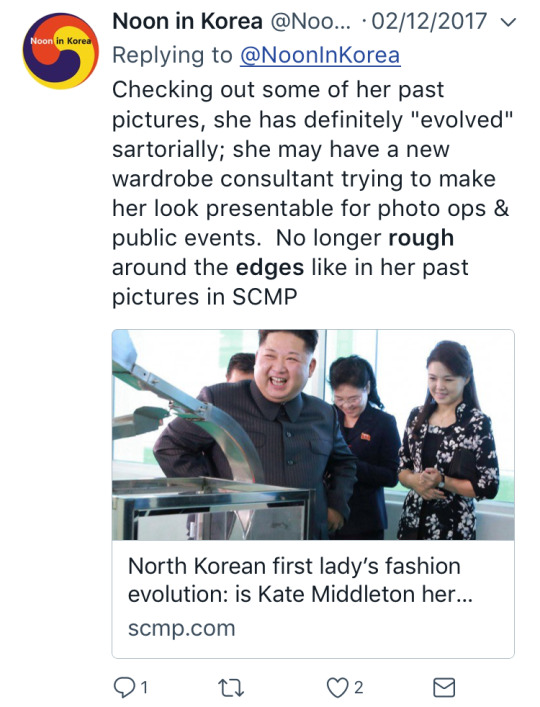
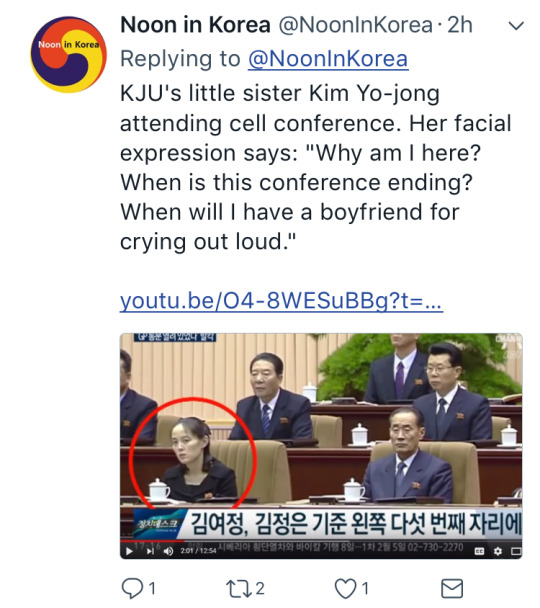
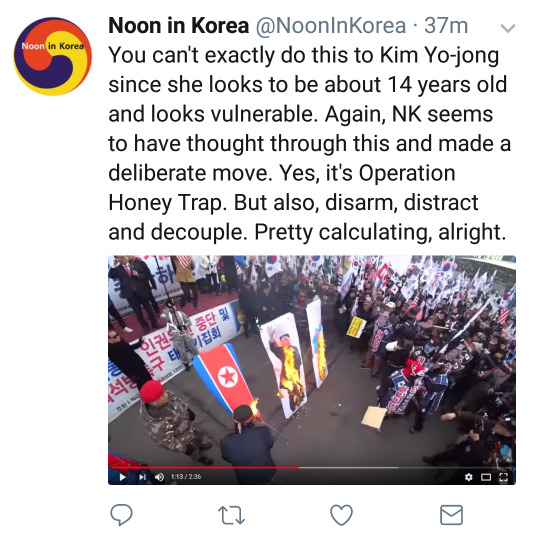
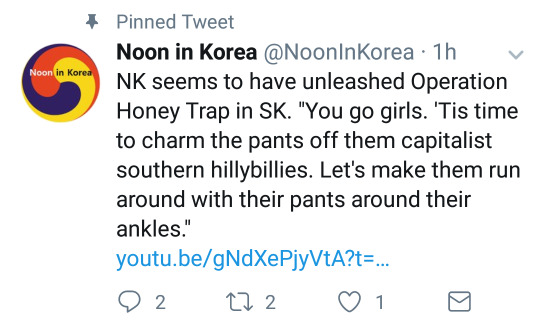
33 notes
·
View notes
Text
Anti-DPRK Propaganda Is Often Just Anti-Korean Propaganda (Part 4: Celebrity Defector Slanders Both Kim Jong Il and Kim Dae Jung)
In a recent article from anti-DPRK website Liberty Korea Post, celebrity defector Kim Tae-san (former DPRK director of trade in Czechoslovakia) slanders Kim Jong Il and former RoK President Kim Dae Jung by fabricating a conversation between the two and reporting it as fact.
The following exchange, as it is reported by Kim Tae-san, is meant to take place during Kim Dae Jung’s 2000 trip to Pyongyang:
If you don’t believe me, you should check the autobiography by Kim Dae-jung. He wrote about his visit to Pyongyang. Kim Dae-jung was so moved by the passionate welcome the Pyongyang citizens displayed and told Kim Jong-il in the car, “Their devotion for you is really something.” Kim Jong-il replied that there aren’t many who came out on their own volition.

However, this is the total opposite of the conversation that Kim Dae Jung reports in his autobiography. According to Kim Dae Jung, Kim Jong Il told him:
All of those people voluntarily came out to welcome you. We’ll take good care of you during your stay here. Do take it easy.
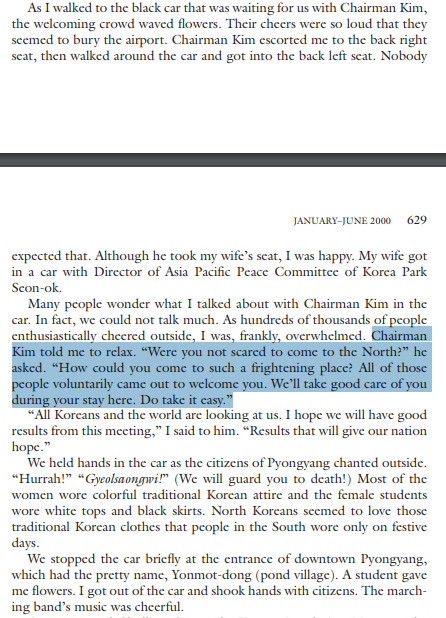
Kim Tae-san originally wrote his article in Korean and posted it to his Facebook.
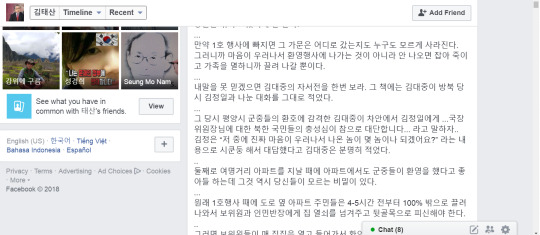
I tried to find any previous citation for the conversation as he reported it in Korean, but it’s clear that Kim Tae-san is the origin. When I search for the specific phrases that he attributes as direct quotations to Kim Jong Il, the only search results on Google and Naver are from people quoting the fabricated conversation. There are no search results from before September 21, 2018. Kim Dae Jung’s autobiography came out in 2010. Even if this conversation somehow appeared in the Korean edition of Kim Dae Jung’s autobiography, but not the English edition, it would have been reported long before Kim Tae-san reported it. In any case, no such conversation between Kim Jong Il and Kim Dae Jung occurred.
17 notes
·
View notes
Text
Western Academia’s War Against Korea, Part 2: Stanford University Attempts to Erase the Revolution from DPRK
Introduction
This entry in the series will examine how Katharina Zellweger — a Swiss diplomat who has spent time in DPRK and now holds a visiting scholar position at Stanford University — has used her personal collection of DPRK "propaganda posters" in a disinformation campaign against DPRK.
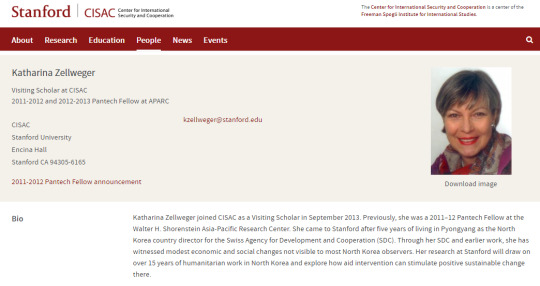
Zellweger and her posters were widely publicized in a January 2018 CNN article titled "What North Korean propaganda posters reveal." The article purported to "present a more nuanced picture of art" in DPRK by showcasing some of Zellweger's posters, which were at that time being displayed at the University Museum and Art Gallery in Hong Kong. However, due to seemingly intentional mistranslations of the posters’ contents, Zellweger presents a distorted view of DPRK socialism.
Erasing DPRK’s Revolution
Not all of the translated poster contents that Zellweger provided to CNN contain errors, but the errors that do exist appear to be intentional and ideologically motivated. Zellweger has stated that she is “not totally against sanctions” against DPRK, and she espouses toward DPRK a support-the-people-not-the-government attitude typical of Western liberals. For example, Zellweger claims: “What strikes me is that the talk is always on political matters, on nuclear or missile programs, or on human rights issues or hunger. The 24 million ordinary North Korean people are forgotten.” Of course, this claim is ridiculous in light of the vast amounts of imperialist propaganda that portrays average DPRK citizens as caricatures of brainwashed simpletons.
Perhaps the most notable errors in the poster contents provided by Zellweger to CNN are two mistranslations that erroneously change the word "revolution" to "innovation." In the first example, Zellweger has captioned the below-pictured poster as "Let us elevate the vitality of the Party's innovation policy on potato farming!" However, it should be captioned as "Let us elevate the vitality of the Party's revolutionary policy on potato farming!"

The translation that Zellweger has provided is inaccurate on a lexical basis, and it also misrepresents the DPRK government's perception of the relationship between food self-sufficiency and socialist revolution. Kim Jong Un addressed that relationship in 2014:
We must farm well by all means and ensure that the people have enough to eat; by so doing, we can smash the enemy’s anti-DPRK, anti-socialist schemes. Now that our country has attained the status of a politico-ideological power and a military power, our style of socialism will remain unperturbed and we can push forward the revolution and construction boldly and at our discretion whatever the enemy’s moves, so long as we achieve self-sufficiency in food by farming well.
On this basis, food self-sufficiency literally is the most important factor in the success of DPRK's socialist revolution. Therefore, DPRK is not simply trying to create "innovative" policies for potato farming, but to provide fuel for its ongoing revolution.
Another revolution-innovation mixup appears in the poster pictured below. The caption provided to CNN reads "Let us better manage Pyongyang, the capital of innovation," but it should say "Let us better manage Pyongyang, the capital of revolution!"

What would be the point of trying to erase Pyongyang's revolutionary character while incorrectly emphasizing innovation? Zellweger herself says that "there is a certain entrepreneurial spirit developing" in DPRK, which she attributes to younger DPRKoreans. She also claims that DPRK has "changed for the better" in terms of what she calls "the six M’s: market, money, mobile phones, motorcars, middle-class, mindset." It is thus clear that Zellweger envisions a capitalist future for DPRK, and she is likely trying to solicit outside help that could bring about her vision of a capitalist future for DPRK. To representatives of foreign capital, "innovation" sounds much safer than "revolution." We can see the emphasis on innovation in a CNBC article about the Choson Exchange, a supposed non-profit organization that appears to seek DPRK regime-change via the spread of the “entrepreneurial spirit.”
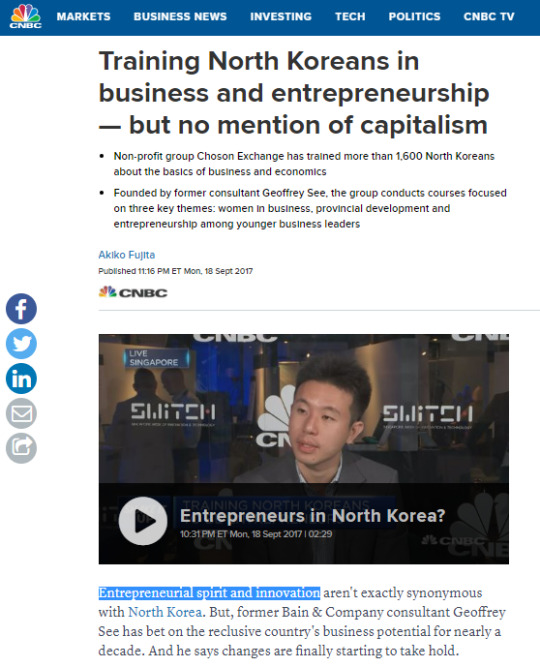
Making a Mockery of DPRK Socialism
Another one of Zellweger’s mistranslations seems to be intended to make DPRK socialism look ridiculous. The caption for the poster pictured below is translated by Zellweger as “My country as the beautiful and salubrious socialist Mount Kumgang!” However, that phrase is obviously nonsense, and the Korean-language caption doesn’t even mention Mount Kumgang. Instead, the poster’s caption actually says something to the effect of “Making my country a beautiful, socialist land that’s gracefully scenic and good to live in.”

Mistranslating this poster’s caption into a nonsense mockery of DPRK socialism would be a logical extension of some of Stanford University’s other attacks on DPRK socialism. Recall that Stanford professor Gi-wook Shin advocated the position that DPRK socialism is “socialism in name only.” By portraying DPRK as a bizarre land in which mountains can become salubrious and socialist, the above mistranslation furthers the myth that DPRK socialism has no basis in material reality.
Conclusion: Questioning the Posters’ Origins
In a video interview about her poster collection, Zellweger displays a chauvinistic attitude toward the “color” of life in the DPRK, claiming: "There really is no advertisement. So these posters are sometimes the only colorful thing you would see." Yet, in another article, Zellweger acknowledges that her posters “were all produced as candidates for propaganda posters and banners, though as far as she knows, none were actually put to mass production.” Therefore, the posters that Zellweger now presents as “North Korea’s public face” were not the same as the posters that she saw in public during her time spent in DPRK. Considering that Zellweger herself admits that these posters may never have been displayed in DPRK, one must wonder whether these posters are exactly what Zellweger claims they are. Were they truly created by DPRK artists at all?
Related
Western Academia’s War Against Korea, Part 1: Introduction, Stanford University, Gi-wook Shin
75 notes
·
View notes
Text
DPRKoreans definitely know the Korean-language name of RoK
It is absurd to claim, as the below-pictured tweet from Jean H. Lee does, that DPRKoreans don't know the Korean-language name of RoK.
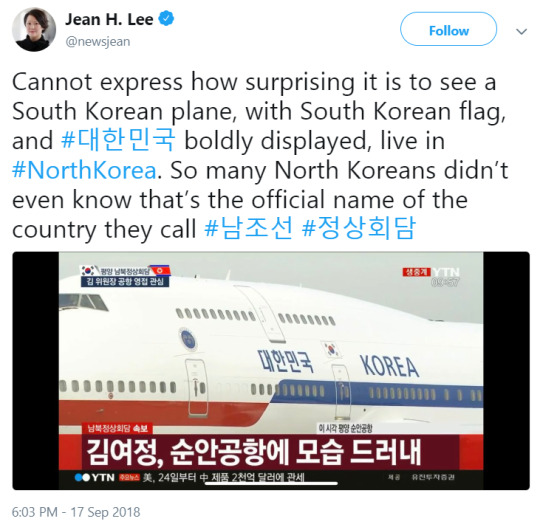
Countless DPRK publications have printed the Korean-language name of RoK over the years. Rodong Sinmun has printed it at least four times in 2018. Take for example the Rodong Sinmun article pictured below, in which the Korean-language name of RoK appears in the very first sentence.

Below is a 2015 RoK news report about a DPRK news report in which the DPRK anchor uses RoK's official Korean-language name. The RoK anchor says this is the first DPRK TV usage of RoK's Korean-language name since RoK's Roh Moo-hyun administration, so DPRK TV had used it before. The DPRK anchor says the name at around 0:55. (Yes, this is a TV news report about a TV news report.)
youtube
Pictured below: RoK’s official Korean-language name and its flag appeared on DPRK TV in 2013, along with a snippet of RoK’s national anthem (screencap from an RoK TV rebroadcast).
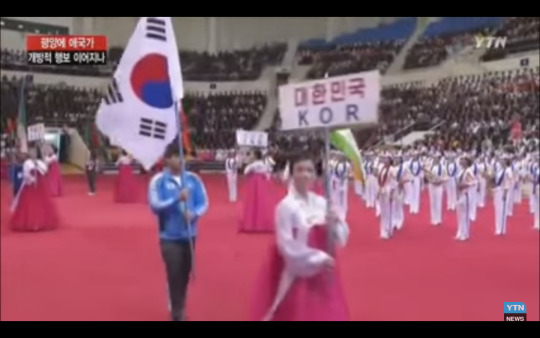
Pictured below: RoK’s official Korean-language name appears in a 1990 volume from DPRK’s Immortal History series.
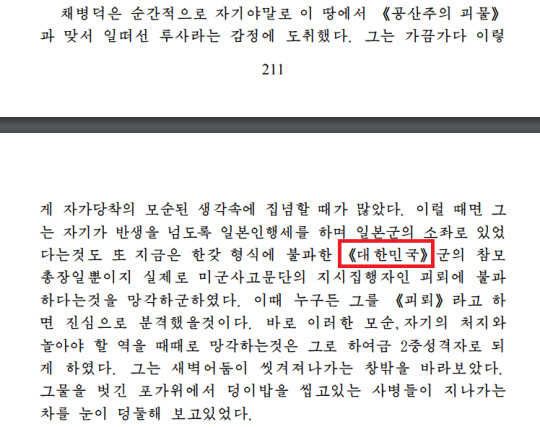
47 notes
·
View notes
Text
Western Academia's War Against Korea, Part 1: Introduction, Stanford University, Gi-wook Shin
Introduction to this Series
In a 2012 interview, Michael Parenti assessed the development of political science in Western academia from the 1960s until the present. He found total stagnation.
It was unimaginable back in 1967 that almost a half-century later things in the profession would be pretty much the same. Today we have the same suffocating centrist ideology making false claim to objectivity. ... [P]olitically safe mainstream academics had — and still have — smoother and more prestigious career paths than those who work from a critical perspective.
Parenti's assessment of stagnation and politically safe support for centrist ideology is applicable to virtually all Western scholars who focus on Korea — not only political scientists but academics from all fields. For decades, Western academics have slavishly supported the USA's and other imperialist nations' assault on Korea. This assault manifests in many ways, including military colonization of the Korean peninsula, a war-crime sanctions regime against DPRK, and domination of the RoK economy by foreign capital.
This series will examine in greater detail the ways in which Western academia and academics have contributed to the war on Korea that the USA and its allies have been waging for more than a century.
Stanford University
Stanford is a huge institution, and it would be impractical for a single blog post to address all the Stanford-affiliated scholars who have worked to lend a veneer of academic authority to imperialist nations' war on Korea. Therefore, this initial post will first examine Stanford's monetary connections to RoK's spy agency, the National Intelligence Service (NIS), which is itself an arm of the CIA in Korea. This post will then briefly examine the anti-DPRK propaganda published by Gi-wook Shin, who heads Stanford's Walter H. Shorenstein Asia-Pacific Research Center as well as Stanford's Korea Studies Program.
Stanford's Connection to RoK's National Intelligence Service
In late 2017, Seoul prosecutors announced that they were investigating the transfer of $2 million to Stanford University from RoK's Institute for National Security Strategy (INSS), a government bureau under the control of NIS. INSS exists as an outlet for the RoK government's own anti-DPRK propaganda, and as such it provides golden-parachute jobs to high-profile DPRK defectors like Thae Yong-ho, Kim Kwang-jin and Ko Young-hwan.


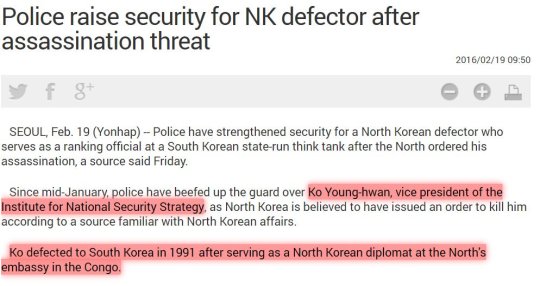
The $2 million had supposedly been diverted to INSS from NIS's "fund for overseas operations" between late 2011 and early 2012 by Won Sei-hoon, who was NIS director from 2009 to 2013.
Prosecutors allege that Won diverted the money to Stanford in an attempt to secure an academic position for himself after his planned retirement from NIS. Won had served as a visiting scholar in Stanford's Korean Studies Program (KSP) during 2006 and 2007, and he was featured in KSP promotional materials as late as 2011 (as pictured below).
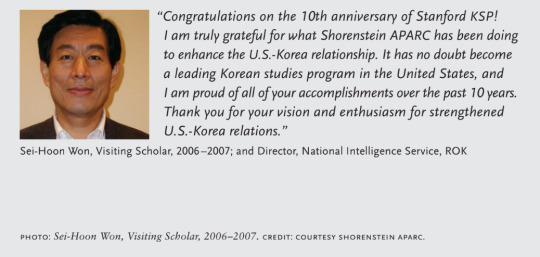
Regarding the money sent to Stanford, Won was eventually indicted for misuse of state funds in late August 2018. However, Stanford University has not returned the money that Won supposedly sent them. Furthermore, the Seoul Central District Court has continually proved unwilling to aid prosecutors' efforts to reclaim the money. The court has rejected prosecutors' requests and appeals seeking asset forfeiture orders or levies against Stanford, claiming that the $2 million from NIS has been mixed with Stanford's total endowment and no longer exists in kind.
Considering the Seoul court's staunch rejection of efforts to return the NIS money to RoK, it appears that the RoK government and its US colonial masters may not actually want the money to come back. In that case, Stanford is likely providing a service for the US and RoK, for which it must be compensated. If Won Sei-hoon takes the fall for misuse of state funds, then he would likely do so as part of a limited hangout that would seek to portray the payment to Stanford as a one-time mistake by a corrupt public servant — not an ongoing program through which RoK pays Stanford for services rendered.
Gi-wook Shin, director of the Walter H. Shorenstein Asia-Pacific Research Center at Stanford
In November 2017, Seoul prosecutors investigating the transfer of the $2 million from NIS to INSS to Stanford called to investigate Stanford Professor Gi-wook Shin. Considering Shin's positions as director of Stanford’s Walter H. Shorenstein Asia-Pacific Research Center and Korea Studies Program, as well as Shin's own anti-DPRK propaganda work, it seems that he would play a prominent role in managing Stanford's monetary connection with the RoK intelligence community.
Even a brief perusal of Shin's writings about DPRK shows that he would be ideologically well-suited to managing an anti-DPRK disinformation program. In his 2006 book Ethnic Nationalism in Korea, Shin advances the slander of DPRK socialism as being "socialism in name but not in content."
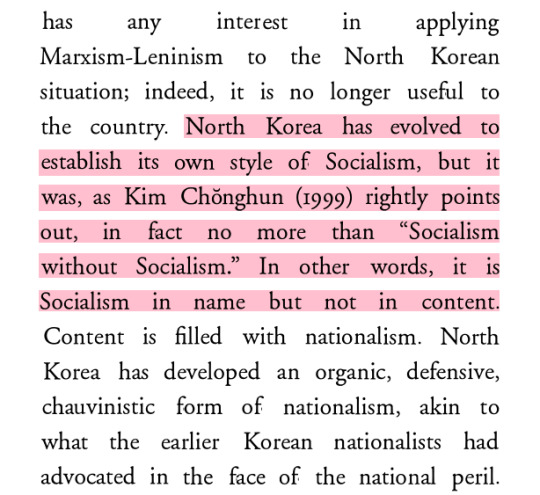
Shin also endorses US scholar Bruce Cumings's ridiculous description of DPRK socialism as "neosocialist corporatism" bearing similarities to pre-World War II Japan, a "totalitarian system" based on ethnic nationalism.
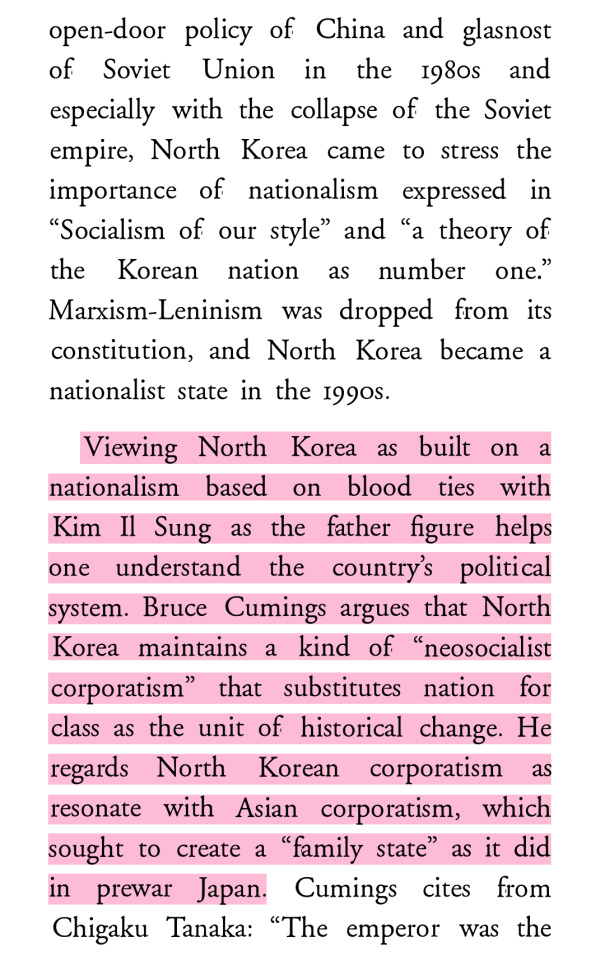
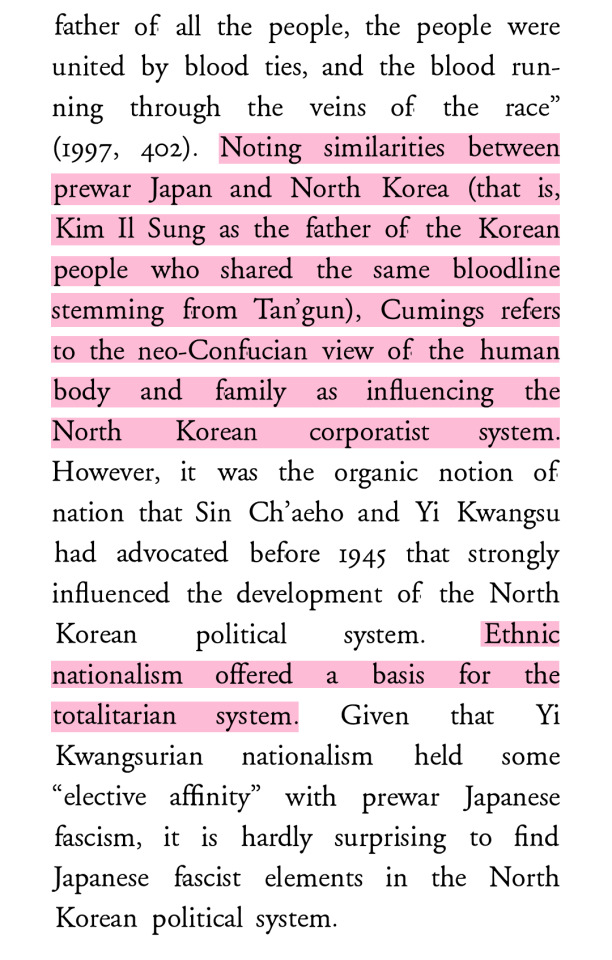
What is somewhat surprising about Shin's anti-DPRK propaganda is just how unacademic it appears to be. Shin barely scrapes the surface of DPRK literature, and in the above-pictured passage on Cumings, Shin eschews Korean-language texts altogether. Perhaps that is one of Shin's objectives: to direct his audience away from the variety of Korean voices and toward the ideologically narrower field of white USian propagandists.
The next part of this series will examine a Stanford disinformation operation against DPRK, in which Stanford literally tries to erase the revolutionary qualities of DPRK socialism.
(Notes: This post's reliance upon evidence unearthed by Seoul prosecutors should not be interpreted as a blanket endorsement of Seoul prosecutors' work in general. Prosecutors uncovered the evidence connecting Won Sei-hoon to Stanford in the process of investigating Won's role in NIS election-rigging during the 2012 NIS presidential election. The current RoK administration's decision to release the evidence connecting Won to Stanford may be somehow connected to its decision to cut funding to Johns Hopkins University-affiliated think-tank 38North. Johns Hopkins and 38North will be discussed in a future post.)
Related:
Western Academia’s War Against Korea, Part 2: Stanford University Attempts to Erase the Revolution from DPRK
#stanford#gi-wook shin#dprk#rok#korea#north korea#south korea#won sei-hoon#nis#inss#bruce cumings#thae yong-ho#kim kwang-jin#ko young-hwan#walter h. shorenstein asia-pacific research center#academia#michael parenti
41 notes
·
View notes
Text
Injecting Mysticism into DPRK Texts via Mistranslation
The quotation pictured below should be translated as "on Earth," not "under heaven." Anti-DPRK propagandists make opportunities to inject mysticism or divinity into DPRK texts, as this feeds the false myth that Kim Il Sung, Kim Jong Il and Kim Jong Un think of themselves as gods.
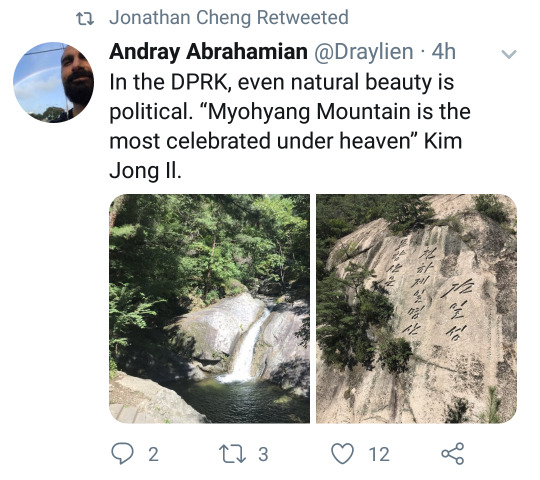
The particular vocabulary that's being mistranslated (cheonha, 천하) derives from the Chinese characters meaning "sky" (天) and "under" (下).
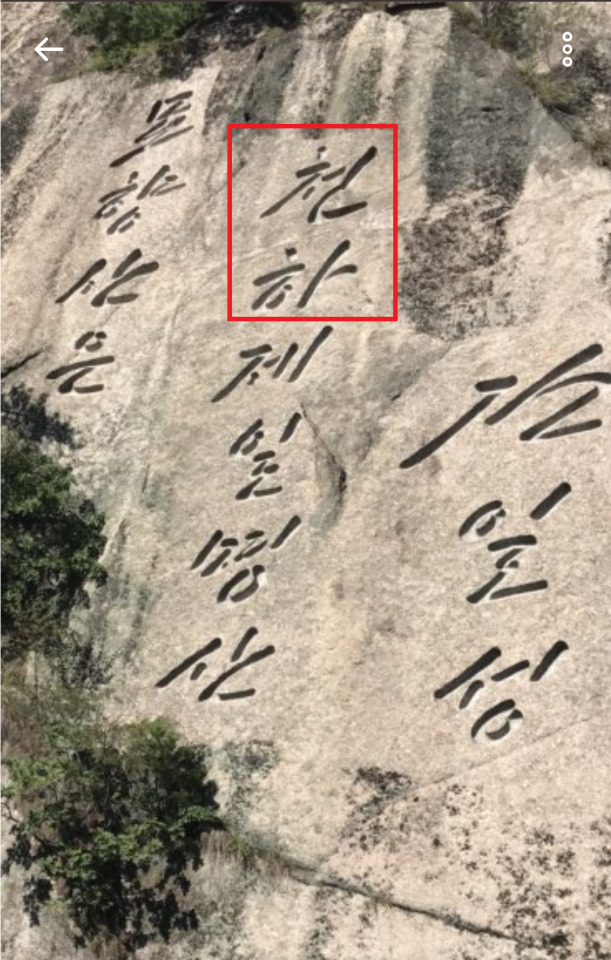
DPRK translators render it as "on this planet" and "in the world." I haven't seen them translate it as "under heaven."
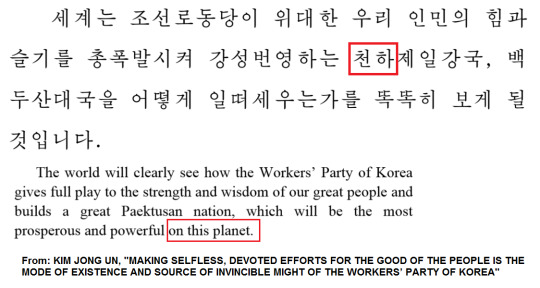
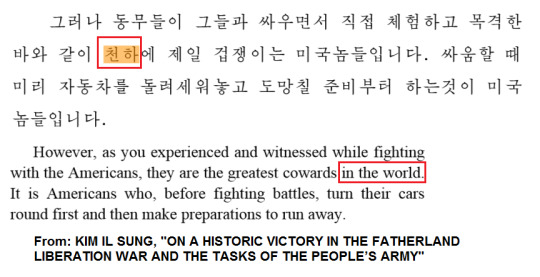
The translator (Andray Abrahamian, former head of a DPRK regime-change advocacy group called Choson Exchange) also incorrectly attributed the quotation re Mt. Myohyang to Kim Jong Il, when it is actually from Kim Il Sung. His mistranslation was retweeted, errors intact, by Wall Street Journal’s Seoul bureau chief (Jonathan Cheng), who apparently found nothing wrong with it.
Another example of anti-DPRK propagandists injecting mysticism when there is none: Suki Kim's false description of the DPRK concept of the Baekdu lineage as a "holy energy." It's neither divine nor biological; it's a political concept.
#dprk#korea#north korea#rok#south korea#andray abrahamian#jonathan cheng#kim il sung#kim jong il#mount myohyang#suki kim#baekdu lineage
83 notes
·
View notes